#that you do get this reinforced feeling of a bias on the developers side that is just... sad to see and extremely discouraging
Note
im insanely thankful to you for writing the larian critical posts. i love the game to PIECES but when my friend tells me about the ast*rion scenes and lines and everything and we compare it to what gale has its just... sad. and i appreciate you pointing this stuff out. helps take the rose colored glasses off i guess. all that said, thank you SO SO much for your meta posts theyre SUCH a joy to read <3
thank you so much for your message. it means a lot to me. 🖤
#i should say that i don't like to be negative or overly critical#but i feel like this needs to be pointed out#and i feel like for gale especially it's not only the lack of scenes and development and reactivity in general#but also just how he is treated within the game itself#others and i have talked about how he's ridiculed how he's the butt of the joke to the point where even you playing the protag are made#to feel ashamed of your choice to pick gale#so it just makes for an absolutely double whammy in that sense#that you do get this reinforced feeling of a bias on the developers side that is just... sad to see and extremely discouraging#text: asks#vg: baldur's gate 3#series: baldur's gate#bg3 critical#larian critical
41 notes
·
View notes
Note
I've noticed that you are interested in stories with multiple blind characters and often propose adding more blind characters to a story as a solution. I really struggle with this because it's not as simple as that -- stories don't have infinite narrative space. The idea that every story has a large cast is influenced by the prevalence of long serialized media in fandom: webcomics, TV shows, etc. But many writers (myself included) write a lot of novellas and short stories which often only have a few characters -- maybe even only 1 or 2! Even novels don't usually have huge expansive casts -- maybe 5 main characters with some additional side characters.
Considering this, I don't understand how it's realistic for every story (or even, say, 50% of stories) to have multiple blind characters (without it feeling forced). This is compounded by the fact that most blogs that talk about other forms of representation say the same! So if I write a 2-character short story and the protagonist is a blind Latino man, does the second character also have to be a blind Latino man? It just doesn't make sense! This is just a general problem I've noticed in discussions around representation -- there's an assumption that every cast will have 10+ characters and narrative space to develop those characters, even though that's not realistic for most narrative forms.
Do you have any thoughts on this?
Writing Multiple Blind Characters in Short Stories
Hi Anon! Surprise. I write short stories as well. I have experience with this. I have never felt like my blind characters were forced or unrealistic, even with having several of them in the same story. I’ll try to explain what might help you.
First, the idea that multiple blind characters is forced or unrealistic comes from ableism. Think about why you feel there is a limit on disabled characters. If you can create stories, I would hope you are creative enough to consider the possibility that multiple blind characters could exist in the same place and time. Challenging this barrier opens up more possibilities, allowing you to explore different types of blindness, different reactions to it, different upbringings, and multiple ways of living, adapting, and navigating being blind.
Second, blind characters need access to their own community. This is where they learn how to be blind. This where they get support. This is where they might find understanding and belonging. You can find more information about community here in an excellent reblog. Also, here.
As you mentioned, I often suggest adding more blind characters when writers insist upon using stereotyped portrayals. Having multiple characters with different experiences helps to make your story more realistic and nuanced, contrary to what people might implicitly believe. Having more than one blind character is something I highly recommend because it helps with not having all your representation rest on the shoulders of one character.
For example, if you are worried a main character who has cloudy eyes might reinforce the idea that all blind people have cloudy eyes, having another blind character with a different experience may help. If one of your blind characters is naive and innocent, you might have another blind character who is brash, displays a lack of trust in others, and has a lot of shocking stories. Maybe they’re in a rock band together. They met while playing blind football (aka soccer) on a middle school team. They bonded over their pet cats and sour patch kids.
Or something.
Another important thing to remember when writing is that you have control over the story. Too many writers come to me feeling stuck because they feel they cannot change their story while also wanting to incorporate my suggestions. This makes it challenging to address implicit bias or stereotypes, much less guide writers in going in different directions.
Additionally, I feel uncomfortable with the complaints about other blogs in this ask. I feel like this isn’t really about me, nor is it something I can comment on. I will say that it sounds as if a bunch of blogs dedicated to helping people write marginalized characters are mentioning some of the same things. They are probably doing so for a reason.
However, while it helps, writing multiple blind characters won’t improve every story, which I explained in my review of the book Blind. I was not impressed with this book. I did not feel that the four blind characters were very good, nor did having them help with offsetting the portrayal of blindness as a miserable experience.
Conversely, one of my favorite blind characters is Toph Beifong from Avatar: The Last Airbender. Despite being the only blind character in the show, the writers did a good job with her. Would I have liked her to meet more of her community as she travels with the Gang? Absolutely. Even though I like her, she still never had access to her community after being isolated by her parents for so long.
So, no, you don’t need to have multiple blind characters if the suggestion bothers you this much. I even provided good examples of what to do, what not to do, and times where my typical advice was not as helpful for the resulting story.
However, please consider where these feelings stem from. Consider the origins of the idea that having multiple blind characters is unrealistic. Using the example you provided in your question, I wonder, would you say the same if both your characters were white and abled? Is there any way you can challenge the fear of seeming unrealistic? What about being considered unrealistic bothers you so much?
You don’t necessarily need to have characters in the story for them to exist. Even background characters can help. I will try to give some ideas for this:
Does your blind character have family they can talk about or remember? Are any of their family members blind?
Do they have any friends? Just because the friends aren’t in the story doesn’t mean they don’t exist at all.
Does the blind character have any formative memories or flashbacks?
Does the character who isn’t blind know any blind folks?
Your characters should have lives outside of the story. They should have memories and experiences that made them who they are. This is where you can have other blind characters. Perhaps this is how your blind character can have a community.
However, I would still like to see more blind characters interacting with each other. This is what I want as a blind person. If you don’t want to go that direction, that’s fine.
I hope this helps.
#blind#blind characters#writing blind characters#ask#scheduled post#writing more than one blind character#multiple blind characters#ableism#let blind people have friends and community challenge
198 notes
·
View notes
Note
Why is it when the boys reveal their forehead it looks so hot, I mean it's not a erogenous zone or anything but it's just so sexy
you can actually explain this with visual/perception psychology and i’ll expand on how if you’re interested. ✍️
the secret: it’s 0% about the forehead. utterly and completely zero. big surprise, it’s the brows. and: also about the lips as the actual erogenous zone at play which i’ll talk about further down the analysis.
so, brow reveal. what happens. everything becomes more expressive and recognizable. your gaze is pulled toward the eyes rather than the sides of the face. so far so good and simple.

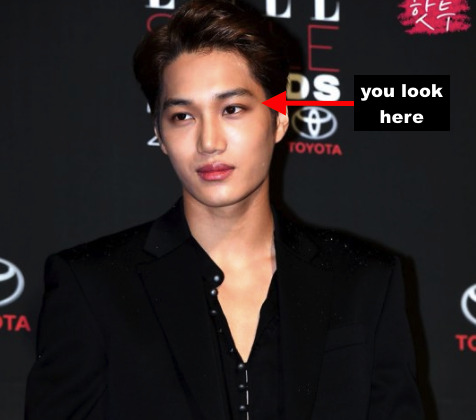
they’re a great visual anchor, result: you spend more time looking at the person. mere exposure phenomenon: the more you’re presented with something, the more you develop affinity. exception: you have strong pre-existing bias which would be reinforced to an even greater extreme. but other than that, believe it or not: brows will make you feel more positively about the person.
how much they convey health as a sexual indicator is an undecided topic and i find most research around that dubious, but there are studies how they’re very important for attractiveness especially when they are thicker. which goes without saying, it shows good hair growth which again reflects back to the person’s health seen as attractive since it feels secure to be with them. with the brows concealed, that pointer is missing.
also: brows convey macro-/microexpressions. you can read them accurately without bangs, so the person becomes more ‘transparent’ aka more inviting. you can gauge the entire outline of the face, too, so that openness is another bonus and also reveals the entirety of their emotional stance. bangs keep you wondering and convey distrust even if ironically, the idol often looks cuter with them, while with brows you see a more edgy slant.
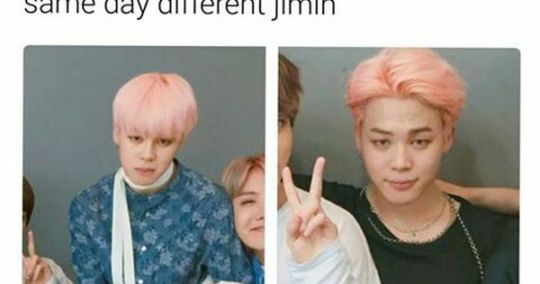
now here comes an even more important factor if we stick to how eyes play a role. seemingly it’s mostly idols who cause a lot of excitement when they show their forehead, or they started/polarized that fandom trend at least. it’s a continuous staple for fans to get wowed again and again. think about it... all south korean idols have brown eyes. and black hair. that’s why there’s an even stronger visual anchor because of how much contrast they create.

so if your gaze is directed upward once the hair is pushed back, the eyes magnify that effect. they reveal the golden ratio that most kpop stars have in their facial proportions so that’s jackpot basically. the idols famous for their forehead looks all have extremely dark eyes and proportions that only wait to be shown. makeup amplifies that effect so it’s a triple threat. look how much clarity and proportion it gives the face.
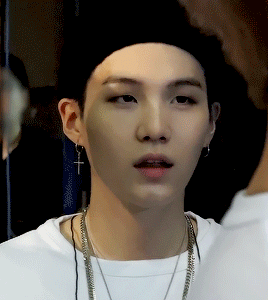
that’s why i say you actually do not look at the forehead first. you look at the T-zone (brow to brow or eye to eye, nose to chin) which humans naturally and universally do to perceive faces. in psychology you can track eye movement (saccades) with special glasses or cameras — see test person below— and turn it into a chart. see how the eyes-nose-lip zone is all you look at and not the forehead?
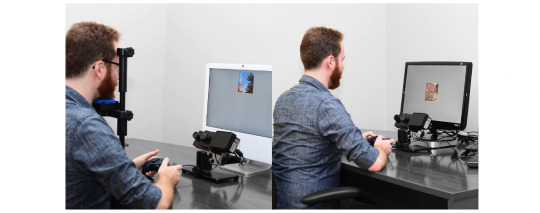
(the chart looks a bit scary but it’s just showing the progression and stops of your eyes)
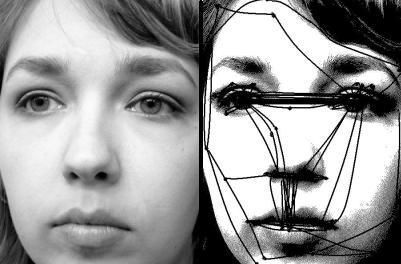
without the brows, the T-zone is less visible or strong. in fact, some kpop styles even hide the eye area. which means your eyes will not trace the T-zone as much. which means you will not look at the lips (!) as much which... here goes your keyword: ARE THE EROGENOUS ZONE. makes sense? no bangs, more T-zone emphasis, more visual direction toward the lips, more sex appeal.
and the last explanation: bangs rule k-pop. hair needs to be longer to be dyed in a way that yields a bigger area of color that gives great cinematic results on screen. plus: SE asian hair is extremely hard to shape for a shortcut. so the prevalence of bangs and how thick the hair is (further covering the brows) has kind of deprived us from the things listed: emotional transparency, golden ratio, health indicators, recognizability, visual anchor, contrast, focus on the eyes and lips. so, the big reveal has more impact through rarity.
and that’s my friends is why forehead reveals are such a big deal in k-pop💡
402 notes
·
View notes
Text
The Voyage So Far: Wano (Part Two)
east blue (1 | 2) || alabasta (1 | 2) || skypiea || water 7 || enies lobby || thriller bark || paramount war (1 | 2) || fishman island || punk hazard || dressrosa (1 | 2) || whole cake island || wano (1 | 2)

okay so the wano flashback is possibly my favorite in the whole series for a whole bunch of different reasons, and oden as a character is a big part of why. honestly, i think he’s great. he’s wildly entertaining and ridiculously likable, just like a folk hero should be.
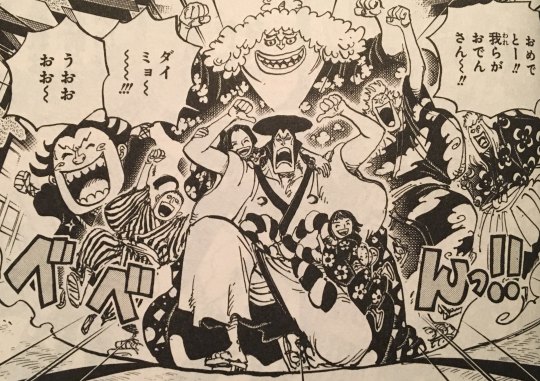
i care about oden and the akazaya nine a lot. they have one of my favorite found family dynamics in the whole series, up there with the strawhats themselves- a bunch of thugs and castoffs who wound up gathering around this one wildly charismatic moron and deciding to be stronger and better for him.
i think they really feel like a family, in these little moments we get of them just interacting and messing around, and it only makes later events- oden’s death, the twenty-year separation, kanjurou’s betrayal- hurt all the worse.
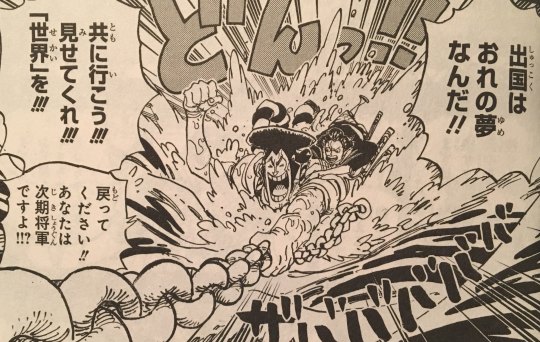
on god it is the funniest thing on earth to me that this is how oden and izou wound up on whitebeard’s ship.
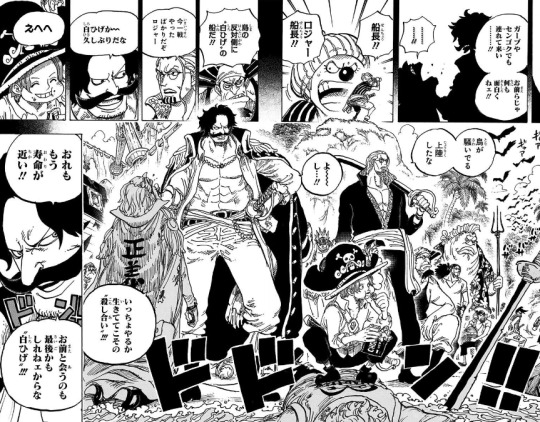
the roger pirates!! i really really like the roger pirates!! i love that there’s this entire predecessor crew who are both absolutely fucking fascinating from a lore perspective and who are just all individually really good characters with really fun relationships. the dynamics we get to see just in this brief part of the flashback are absolutely delightful. i think the fact that i would read a whole series just about the roger pirates is a testament to oda’s character writing.
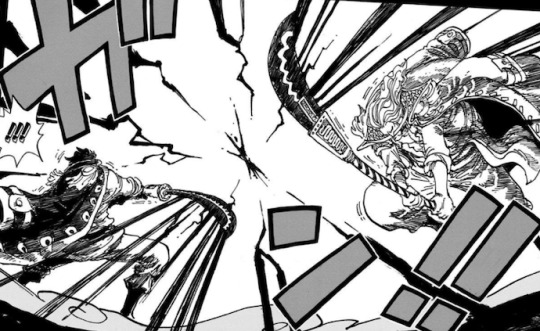
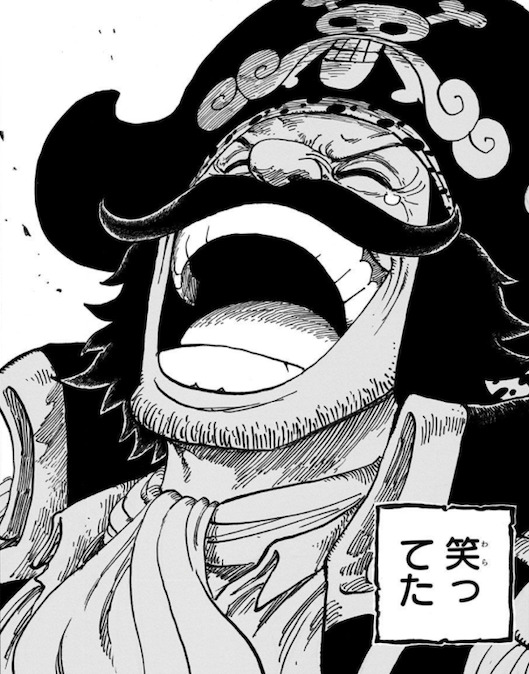
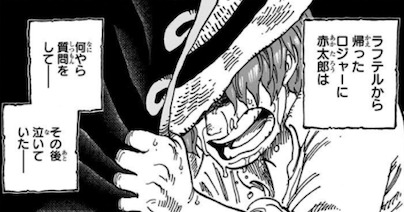
there’s a specific sort of tragedy to the roger pirates, and i think it really hits home in their last few pages in this flashback. by all appearances, they were a crew just as close-knit as the strawhats are. they cared about each other a lot- that ship was their home.
and then their captain died, and they just- fell apart.
awhile back, in my sabaody post, i talked about how we get to know roger first as a story and then as a character by getting to meet characters who knew him personally. to the rest of the world, roger is a story, a name to curse or a height to aspire to. but for shanks and rayleigh and crocus and buggy and all the rest of the roger pirates, he was their captain.
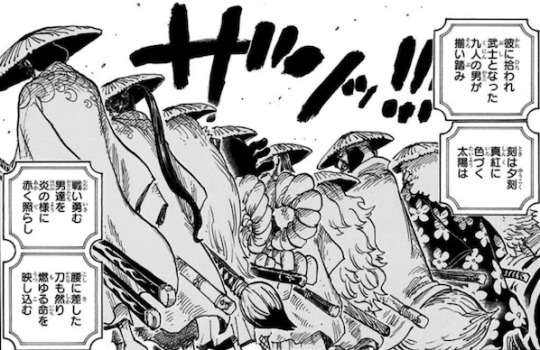
the whole wano flashback, possibly more than any of the others in the series, really feels to me like a story being told, a folk tale being passed down, which makes sense, since it’s canonically framed as oden’s diary entries. and i think that framing device just adds so much to the atmosphere of this entire section of story, the feeling of myth and legend to it.
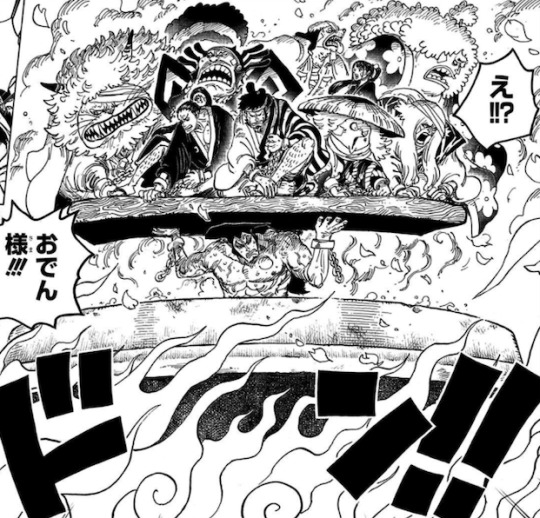
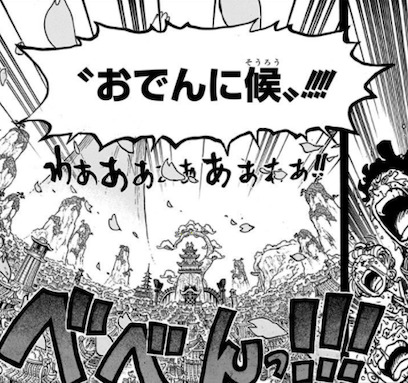
i honestly really like how oden’s death is handled. i have trouble articulating it, but it’s so much, so over the top, so heavily set up and foreshadowed- a legendary death for a legendary man, if that makes sense.
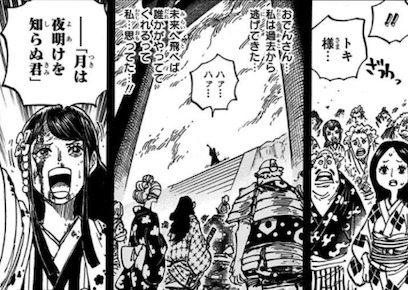
toki’s prophecy is one of my favorite motifs in this whole arc. wano is all about a country that’s been trapped and dying for years and years, holding out desperate hope for salvation. toki is the one who gave them that hope. she doesn’t try to tell them that everything will be okay, she says it will be dark and the darkness will be long, but the dawn will come, and even though she gave her life to do that, she did it smiling.
without toki, the wano arc never would have happened, because there would be no future to fight for.
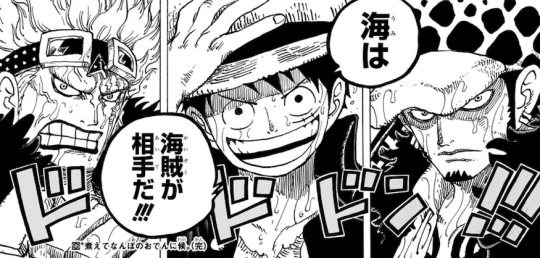
this panel is the header on my favorite op discord server and sometimes i just scroll up and stare at it. it’s so good.
this entire sequence, starting from luffy law and kidd’s entrance, is probably my favorite in wano arc. it’s the turning of the sides, the daybreak after the darkest hour- these three show up, and then jinbe, and denjirou reveals his true colors and it’s revealed all the rest of the samurai left before orochi blew the bridges, and it turns out they haven’t lost a single step to kanjurou’s treachery. it just feels so good to read, after the prior hopelessness of the akazaya and the tragedy of the flashback.
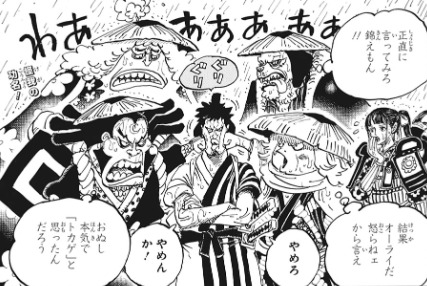
i really like how the akazaya nine are absolutely ready to roast each other at any and all times. that’s how you know they’re best friends.
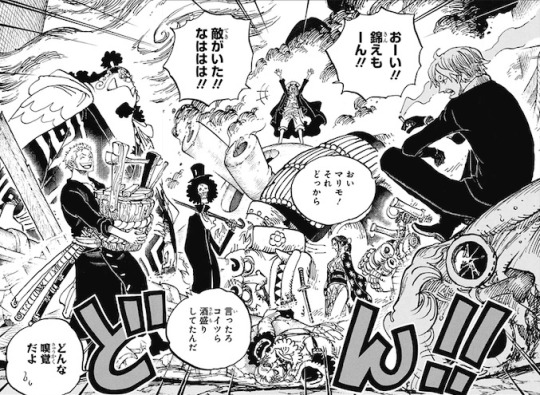
i think i mentioned it back in fishman island, but one of my favorite things is the strawhats just being absolutely cheerfully, chaotically destructive. every time we get to see them wreck havoc while nonchalantly bickering with each other it puts a huge smile on my face.
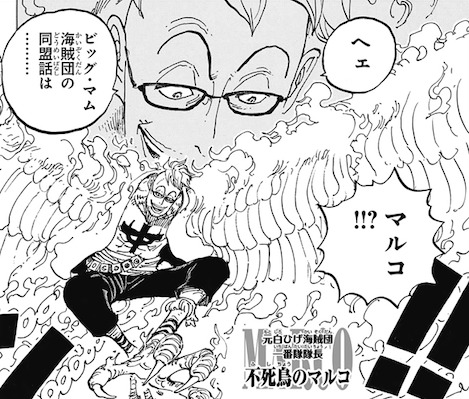
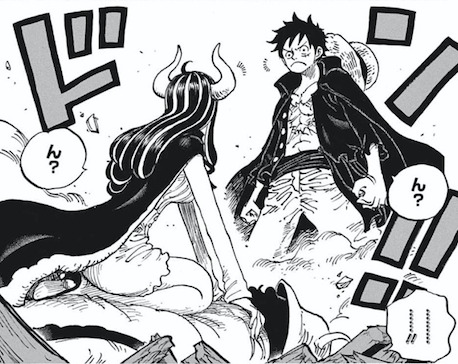
i think ulti and page one are very very funny and i like their dynamic a lot, it’s a laugh riot. i also like that oda lets luffy seriously fight a woman here!! i’m serious, we don’t see enough no-holds-barred fights between men and women (conventionally attractive women, specifically) in this series, so i’m pleasantly surprised when it does happen.
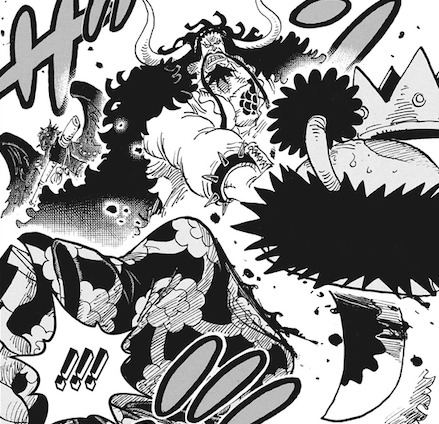
i do appreciate wano’s ability to continuously raise the “holy shit!” quotient without it ever really feeling like a twist just for the sake of the audience. like, i don’t know that anybody saw kaidou killing orochi coming, but at the same time, it feels like it does make sense, given what we know about kaidou, for him to do this.
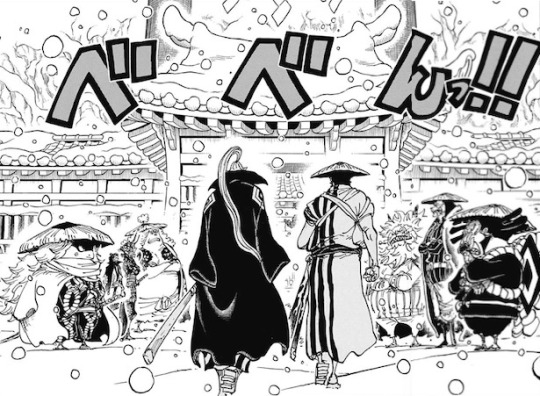
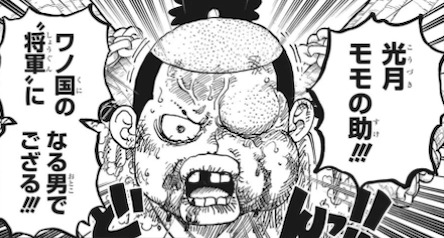
my heart goes out to momo, honestly. he’s only eight, and in that time he’s lost his home and family and his whole world when he was thrown twenty years into the future, and he has the weight of his whole country resting on his shoulders. he’s borne up admirably under that stress, starting from zou and building up to this point.
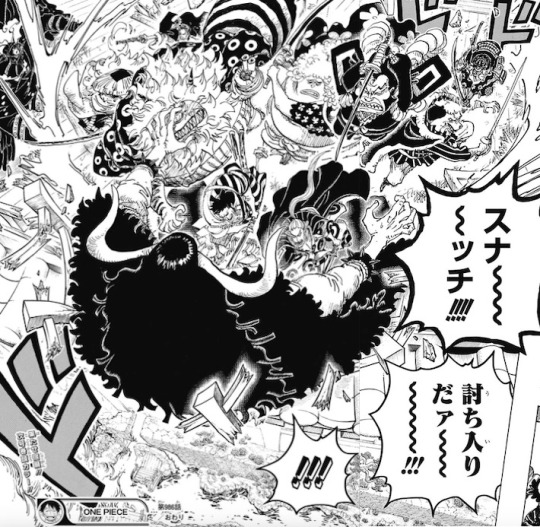
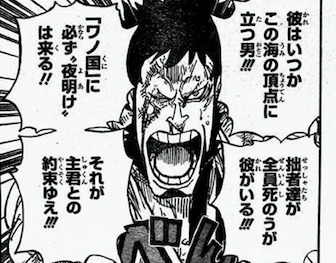
i LOVE kin’emon’s speech to kaidou about luffy SO much. kin’emon’s come a long way from being a mostly comedy relief character in punk hazard to here, where he’s shouting down an emperor. i really like this progression- kin’emon doesn’t change, exactly, but the side of his character that is revealed in wano is very likable and admirable. it goes back to something i’ve mentioned before, about how one piece’s characters are very rarely one-dimensional.
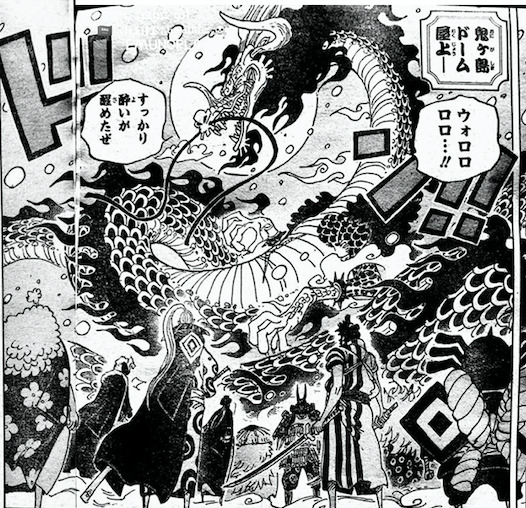
kaidou’s dragon form is extremely cool, and so are most of the panels where it appears- it’s extremely striking, especially in panels like this, where he’s silhouetted against the moon.
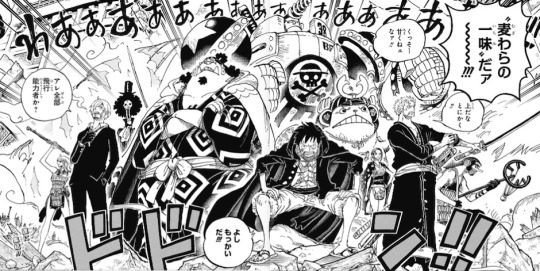
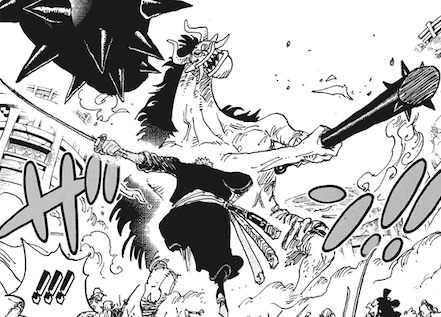
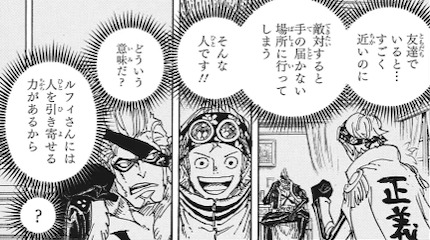
i love... the ripple effects of luffy just being himself that spread throughout the world of one piece, and i think this is one of the best examples. luffy befriended coby all the way back in chapter two, mostly by accident, and now, nine hundred and some chapters later, that’s what leads to drake joining the strawhats’ side. because drake is friends with coby who says luffy is trustworthy, so when drake is stuck with nobody else to turn to, he turns to luffy.
moments like this really reinforce just how much the world and story of one piece is built on relationships between people, and i really like that. i like that instead of necessarily being built around abstract ideals or morals, characters’ actions are, more often than not, motivated by either specific personal goals or by their relationships with other characters. it feels much more true to life.
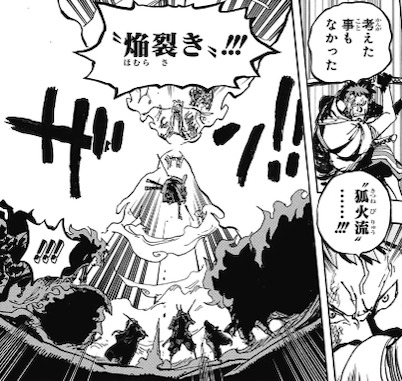
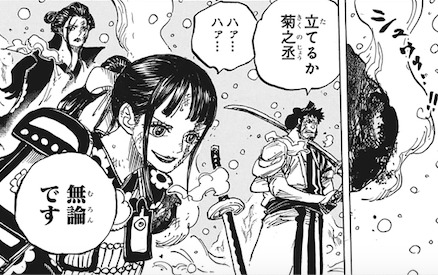
i like the loss of kiku’s arm, because it showcases exactly how serious the fight is on both sides. it both shows that kaidou is fighting to maim and kill and do whatever it takes to win, and that the akazaya are fully prepared to take whatever he throws at them. kiku gets back up smiling after losing her arm. neither side in this fight is even close to backing down, now or ever.
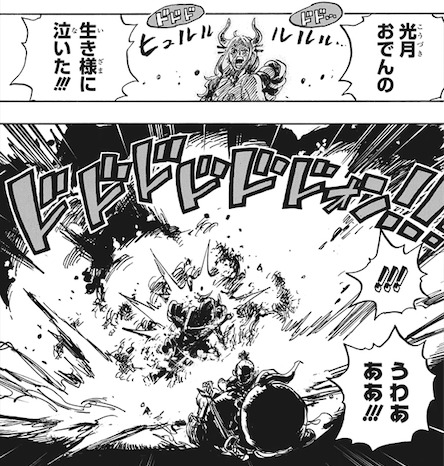
i genuinely can’t believe how long it took me to talk about yamato, so let me just say: i love him so much. part of this, i’m sure, is my personal bias towards any and all kickass queer characters, but part of it is just- he’s so cool. he’s ten feet tall and carries a club about as big as he is and tanks explosions like they’re nothing while also bickering with luffy and falling out of ceilings and generally being like... stupidly lovable.
i just like yamato a lot.
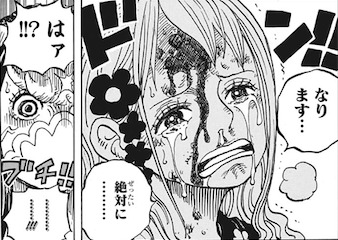
a thousand chapters in, and every strawhat but robin has had a moment where they declare luffy is going to be the king of the pirates, but honestly, i think nami’s might be my favorite yet. nami has always been a person who acts at a distance, not one inclined to direct confrontation and putting herself in danger-
and yet, when it comes down to it, when faced with a choice between death and disavowing her captain’s dream, even when assured by usopp that she would be fully justified in lying for her life, nami chooses luffy. even in the most dire of circumstances, all of the strawhats know luffy is going to be the king of the pirates, and none of them would ever deny it.
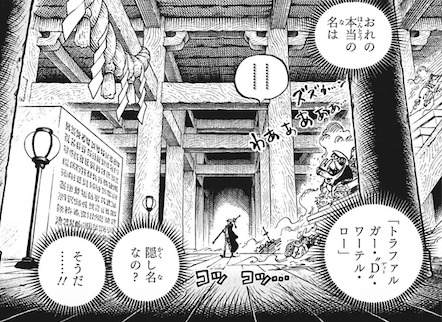
i kind of alluded to this back in my dressrosa post, but i really like the development of law’s new dream being discovering the meaning of the will of d. it just feels like a very good and natural progression for his character, given he’s the only holder of the will of d who we’ve been shown is consciously aware of it and what it might mean. and in general, i like seeing him having something else to work towards after doflamingo’s defeat.
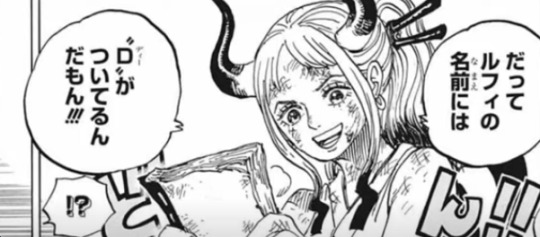
i’ll end this by just saying i am so desperately curious to know what is in that book, and what yamato knows about the will of d, about the dawn of the world, about laugh tale.
guess we’ll find out, huh?
thanks for reading through to the end!! i had a lot of fun putting these posts together, and writing them up was a really cool way to be able to compile my thoughts headed into chapter 1000 and beyond. i can’t wait to see where oda takes us next.
199 notes
·
View notes
Text
Rian Johnson did Finn dirty and we gotta stop pretending he didn’t
Every now and then I am reminded how I hate how dirty Finn was done in the Sequel Trilogy. TFA started it, but TLJ continued it. JJ started it with the bait and switch, Rian continued by making sure Finn would remain a side character, which JJ would finalize in TROS.
Like I like TLJ for the visuals and Rey and Ben’s dynamic, but let’s be clear. It absolutely did nothing for Finn, Poe or Rose. Pretty much all the characters of color were given the shaft.(and one of them didn’t even get any speaking lines, NO I WILL NEVER NOT BE MAD ABOUT THIS)
Let’s take a look at what Rian Johnson did with Finn
Finn is repeatedly harmed for comedic effect. Most of his important scenes were either cut or rewritten. He is constantly belittled and mocked throughout the movie.
The beginning of Finn in the movie. Finn awakens from his coma. Does he struggle to come to terms with his near-death experience? Is he fearful that Rey is dead and he failed her? Is he scared, in pain? Nope. He falls on his face and squirts juice everywhere. The medics on-duty were on a coffee break and allowed their patient to wander the fucking halls unattended. And with that, his duel with Kylo is worthless and made a joke to laugh at.
Finn’s deleted scenes. The deleted opening where Finn wakes up. Finn and Poe’s scene on the Raddus where Finn declares he’s not joining The Resistance, but Poe simply says “you are where you belong” and hands him his coat after stitching it up for him. Then the scene where BB-8 shows Finn Rey’s last moment with Finn. Then the deleted scene with the one Stormtrooper where Finn shows restraint. and Finally the scene that shows a better death scene for Phasma......why were any of these scenes deleted? ESPECIALLY THE PHASMA ONE! I will never understand why this was deleted. Finn calls her out about her betrayal of lowering the shields and when this information is revealed, the Stormtroopers near her look suspicious and it looks as if they are going to turn on her. Phasma like the ultimate survivalist she is kills them with no hesitation. Finn cuts her hand off and blasts her into the abyss, giving Phasma a more deserving and better send off. Seriously, this is way better than their actual confrontation. What I really like about this scene is its direct connection to The Force Awakens plot point and that it acknowledges Phasma’s survivalist attitude which was introduced into her novel.
Finn’s injuries do not get attention, but Kylo’s injuries do.
In The Force Awakens, Finn fights Kylo Ren. He does well, but is ultimately defeated. He is slashed in the shoulder and the spine by Kylo Ren and falls into the snow, unconscious. Now if this were in the first 6 movies, Finn would be dead or would be paralyzed. But because it’s a Disney movie, Finn heals up. Rey continues the fight and slashes Ren across the face, leaving him with a gash. The characters all escape, but Finn has to be carried to a medical station, unconscious until TLJ. Kylo Ren seems fine, ultimately jumping in a TIE fighter to try and kill his mom before getting patched up further. Finn, again, has to wake up before doing anything. Here’s the difference between Finn and Kylo’s injuries. Finn awakens in a medical bed wearing a bacta suit. His first instinct is to call out for Rey. As he jolts up, he slams his head against the medical container. He slams against it again. Regaining awareness, he opens up the medical container to find himself alone in a cargo room. He falls out of the bed, spraying medical fluids all over the place. He trudges down the hallway until Poe and BB-8 find him. His injuries are never mentioned, shown, or even referenced again. Kylo, on the other hand, is asked by Snoke how his wound is, to which he responds “it’s nothing.” He then takes that ridiculous thing off, complete with a close-up of a sad kylo Ren face, with his sutures framed to draw attention to them. This happens again in the elevator. Then we get a scene of him getting patched up soberly by a medical droid. Then we get a shirtless scene as a final showcase of his other two scars. Throughout the film, Kylo’s scars are present and framed as a constant reminder that he went through pain. Finn’s injuries are used as a joke once and promptly forgotten, and let’s not pretend that these injuries are one-to-one aside from how they’re framed. Remember Finn received injuries trying to protect Rey, while Kylo received injuries trying to murder Finn and bring Rey before Snoke, a fate worse than death. Finn received a deep wound across his spine, which can often be fatal in the real world. Kylo received a gash across his face. Finn’s injuries were worse and nobly gained. Kylo’s injuries were comparatively tame and well deserved. Yet the movie uses Finn’s pain as a joke, and Kylo’s pain as a humanizing factor. That Rey, as well as the director, cinematographer, and a considerable portion of the audience sees a scar and is willing to find sympathy with the person, no matter what they have done, is pretty reprehensible. Not only is Kylo Ren’s scar not enough to be considerably a change to his appearance, as Rian Johnson specifically modified the location of his scar because, “it looked goofy,” the scar is not the mark of an accident or from an assault, but rather from a failed assault on his part. Also, I could get into how messed up it is that scars that don’t fit Rian Johnson’s preferred model are considered goofy. Is a scar that isn’t kept to one side of the face not worth showing? Is a person with a scar you don’t personally like somehow less able to be taken seriously? By treating Kylo’s minor wounds as a big, life-changing deal, and treating Finn’s life-threatening wounds as a trivial matter of no more consequence than a joke, The Last Jedi reinforces century-old stereotypes about Black people. Specifically, it implies that Black people are somehow less affected by pain, have higher pain tolerances, or cannot be physically damaged the way White people can. This is a demonstrated, dangerous trend, where white people actually perceive Black people as experiencing less pain than White people under the same situations. Older textbooks, including some used as recently as late 2017, suggest Black people over-report the pain that they are experiencing. Doctors have declined to give painkillers to Black patients expressing the same level of discomfort that would grant a White patients the same painkillers, and some surgeons even believe that less anesthesia is needed for operations on Black people. This, of course, goes beyond the medical field, where Black people are not believed when they speak about suffering, and are expected to take more physical abuse than their White counterparts. However as the injuries are framed in a medical setting in this movie, I wanted to primarily address the medical bias as in the real world. This has been referred to as an empathy gap. When two people are hurt, with everything except the skin colour being the same, and White people feel worse for the hurt White person, there is a gap in empathy. Now, when the conditions are not the same, and the White person deserves to be hurt, and is hurt much less, and is still empathized with more, and the White man’s acts of attempted murder are framed as romance, while the Black man’s friendship is framed as harassment.
Let’s also talk about Finn’s treatment. He’s placed alone in a room filled with cargo, without any monitoring. It’s almost like the medical staff doesn’t even deem his injury serious enough to receive attention. He’s not on the medical ship, which we know they have. He’s not even in the Raddus’s Medical Bay, which, again, we know they have. Finn is isolated, left unattended, injures himself, and stumbles out into the hallway without any assistance. All for a joke. Finn’s injury should have been treated with respect and acknowledgement. A scene with the doctors examining his injuries, telling Finn he is medically clear to join The Resistance and Finn sorrowed by his inability to help his friends, would have been light-years better than a scene where Kylo looks sad getting hurt while trying to kill people.
Finn’s rivalry with Kylo Ren drops instantly. Like Finn’s injuries, Finn’s rivalry with Kylo Ren is dropped for no reason whatsoever and never mentioned again. Finn and Kylo Ren are narrative foils, yet after TFA it’s dropped??? From the start they have been prominent foils to each other: dark from light and light from dark, both in the First Order but in drastically different positions. And Kylo too obviously has strong feelings about his defection. I also believe that Finn is the awakening in the force that Kylo and Snoke felt. Perhaps that is why Kylo focused on Finn and is so angry about him. Finn is also the first person to use the legacy lightsaber and is the first to actually fight Kylo. TLJ could've focused on Finn and Kylo being narrative foils having a force connection and Kylo wondering why Finn would switch to the Resistance while Finn wonders why Kylo joined The First Order and Rey standing in the middle of it all wondering with the new realization that her family has a mixed past of good and evil and her questioning where exactly does she belong? The way at the height of tfa when Kylo Ren rejected Han Solo’s offer for redemption and killed him he looked over and noticed Finn. Like they both locked eyes and in that moment was a surge of emotions between them— shock (and some fear) on Finn’s end, and anger on Kylo’s as he shouts at Finn that he’s a traitor— and those circumstances set Finn and Kylo up to be the dynamic for the sequel trilogy. They were foils, and the trilogy had the potential to truly expand on that and see their development in a final standoff/rematch at the very end. But it was wasted, because why have good movies.
Finn repeats the character arc from the last movie. Finn’s character arc from The Force Awakens was dropped completely in The Last Jedi. He does want Rey to be safe, but TLJ paints it as if Finn just wants to run away, despite the fact that he learned to be courageous, face his fears and stay and fight at the end of TFA. The First Order kidnapped Finn as a child, from his family(possibly killed his family) he was able to leave The First Order and resist the indoctrination. He no longer wanted to fight, he wanted to leave everything, he wanted Rey to come with him. When Rey was captured, Finn had something to fight for and when Kylo Ren pushed her. Finn finally stood up to his past and The First Order. He overcame his fear. So Finn should have been wanting to fight The First Order and become a big deal in The Resistance, we could have even seen Finn inspiring a Stormtrooper rebellion against Phasma and The First Order. Finn just wanting to leave is just bad writing and backtracks his entire character arc from TFA.
Went from one of the major focuses of this trilogy to a side character. Finn is the very reason why The Resistance is alive. Finn breaks his life-long brainwashing, informs Rey and Han about the importance of BB-8 and helps out in getting BB-8 to the resistance and provides vital information that lead to the destruction of STB and gets nearly killed while helping to achieve this.
If it were not for Finn saving Poe, BB-8 would’ve been scrapped for parts and Rey never would’ve left Jakku. The map would either be destroyed or be in the hands of The First Order. Starkiller Base would’ve destroyed D’Qar and Ach-To. He is the reason why Poe is still alive. He is the reason why BB-8 isn’t parts and Rey left Jakku. Because of leaving Jakku, this is the sole reason why Han and Chewie were able to find the Falcon. And he is the reason why The Resistance was able to find out about Starkiller Base’s weakness. he Helps out in sabotaging STB so that Poe, the very pilot he saved in the beginning can deliver the finishing blow to Starkiller Base and destroy it completely. In the Last Jedi, Finn awakes from a coma with no one attending him. No medics or guards. He's not even on a medship, he's in the fucking cargo hold. Finn recovering from his injuries is meant to be seen as a joke and his injuries are never mentioned again, while Kylo gets sympathy and shown his scars. There was also no marketing for Finn in the build up to TLJ. Despite Finn knowing that the First Order must be fought and knows there is something bigger than himself and Rey, we then see Finn attempting to flee in an escape pod to hide with Rey. Then he meets Rose. Rose in mourning meets Finn and expects him to be this big Resistance hero, only Finn never officially became one. Rose thought he was deserting. Finn wants to escape to save Rey and because The Supremacy is tracking them through hyperspace, but Rose sees this as desertion….Desertion? You taze people for desertion? How exactly am I supposed to root for either side again? This is probably the same only less lethal treatment one could expect from The First Order. And what if The Raddus took critical damage? Are you trying to tell me Rose would taze anyone going to the escape pods? I thought she was supposed to be a mechanic, not someone who prevents escape. Despite Finn explaining himself, she tazes him. She spends the majority of the movie berating, insulting and belittling him. It's even worse in the novel. Finn, who was the main focus of the last movie, and one of the main protagonists, is now made the sidekick to Rose in a pointless side plot. Finn and Rose then get caught because none of them could bother park their ship legally. Finn, the child slave doesn’t even get to say they should save the child slaves of Canto Bight, instead he blindly follows Rose into freeing the space horses. Then they openly trusts a man who talks like a snake and is shocked when DJ betrays them. Finn and Rose are made to fail their mission pointlessly, when they could've succeeded and get caught on the way to the escape pods. Finn gets to face his oppressor and fight Phasma and end her, but Phasma's better death scene was stupidly cut for reasons I don't understand. Finn then makes one last effort to save The Resistance, the people he loves. Rose stops him. She takes one last chance to insult him and kiss him without his consent as the bunker is destroyed while The First Order prepares to kill what Finn loves....and people see this as love???
The racist undertones of how RIan Johnson wrote Finn. Finn is treated like a racist slapstick caricature. The first real problem for Finn. He is reduced to a slapstick joke in his very first scene. Finn awakens from his coma, slams his face and it is revealed that he isn’t even on the medical ship or even in the medbay on the Raddus...he is in the cargo hold and is made to be a joke. This is the Co-protagonist of the trilogy, and he’s reintroduced as a slapstick joke. Then once again he wants to runaway. I am getting a real racist vibe that Rian Johnson sees Finn as the cowardly black man troupe. That’s just downright disgusting. Moving on. Finn is paired with Rose Tico, honestly I want to like her, but bad writing prevents that. Finn is put with someone who abuses him and we are supposed to root for this and see it as romance? Let me explain.
Finn is then tazed by Rose, which is understandable, she thought he was running away and she was in mourning. He also was objectively posing absolutely no threat to her, wasn’t running away, and was even trying to explain himself. Additionally, just the threat of the taser seemed to have been enough to stop him from leaving. But Rose attacked him anyways. The difference between Rey and Rose attacking Finn is Rey subdued Finn just enough to stop and interrogate him, Rose went completely overboard by paralyzing him and knocking him unconscious. It was completely unnecessary and gratuitous. Rey and Finn have a real friendship and partnership from the last movie. Rose, on the other hand, spends the rest of the movie belittling Finn and talking down to him. The book also says that she thought about using violence against him more than once after the tasing (for annoying her) and even pushed him. This displays a really problematic pattern of violence and disrespect towards Finn so yeah, multiple uses of violence and expressed desire to inflict violence on him as being abusive. I would argue that she is undeniably verbally abusive with Finn. In the movie and in the book (more so in the book) she often belittles him by calling him names and using other put downs. It seems she wants to make him feel bad about himself and bring him down, which is abusive. Of course, it doesn’t really matter what her intent is, even if she doesn’t “mean to be mean” it still counts as verbal abuse. So, in summary, her repeated threats and use of violence against Finn and her continual use of insults and put downs causes me to come to the conclusion that she is abusive to Finn. For the record I am not saying Rose Tico is abusive towards Finn, I am saying how Rian wrote Rose towards Finn is hostile for no reason whatsoever and could be interpreted as abusive and it’s downright tone deaf how the abuse and tazing is directed at the black man of the trilogy.
Then Finn is made to fail. The only time he is allowed to be portrayed as a protagonist is him facing his abuser and taking her down. My only problem is they cut out Phasma’s better death scene. Finn reveals Phasma shut down the shields for Starkiller Base, and that gets the Stormtroopers to turn on Phasma. This is what I would hope starts a Stormtrooper Rebellion. Finn’s defection was withheld information by Hux and Phasma in fear of a full on rebellion. Humanizing Stormtroopers and having one become a hero is kind of genius, but the way they did it in Episode 7 made it seem like Finn was the ONLY good Stormtrooper, which has to be an impossibility. If one Stormtrooper can suddenly switch sides, what's to say that others couldn't? And since Episode IX will most likely see the fall of the First Order, I personally think that Finn should convince all (or most of) the Stormtroopers to turn against Kylo and Hux, leading to a cool final scene where the First Order is ultimately destroyed by their own henchmen, children who were abducted and indoctrinated take back their narrative. That would be cooler and more unique, I think, than another Resistance vs. First Order space shootout, or Rey and her possible Jedi apprentice army taking them down.
The most insulting part of the movie is the last part. Finn’s suicide run. Finn was the best Stormtrooper and knows about The First Order’s weapons, he should know full well that speeder would be destroyed trying to destroy the mini death star. Finn’s attempted sacrifice was pointless, Finn was treated like garbage throughout the movie, he deserved better.
Finn was almost a big deal for the Resistance in the beginning. It is shown through cut material that Finn was in Cobalt Squadron uniform. If this was the case, there is something real simple they could’ve done. Have Finn be with Paige, have Paige and Finn have a short friendship(this actually gives Ngo Thanh Van speaking lines), Paige being in awe that Finn, someone who escaped The First Order helped The Resistance destroy Starkiller Base is working with him and she is more than happy to show him the ropes. They are co-pilots. Finn was able to save Paige from dying in space and instead she dies in his arms while leaving a bloody handprint on his heart, working as a callback to when Slip died in Finn’s arms and left a bloody handprint on his helmet and her last words being “tell my sister I love her. Finn brings the bad news to Rose and gives Rose Paige’s pendant. Rose breaks down and hugs Finn. Both Finn and Rose have a good relationship at this point and there is no pointless hostility. You could even have Finn and Rose together finding the hacker and having their plan succeed and just having DJ betray them as they make it to the escape pod. And Finn and Phasma do have their fight, but keep in the deleted Phasma death scene. Instead of that? Nothing and instead of that we get a conflicting and hostile relationship between Finn and Rose and Paige has no speaking lines.
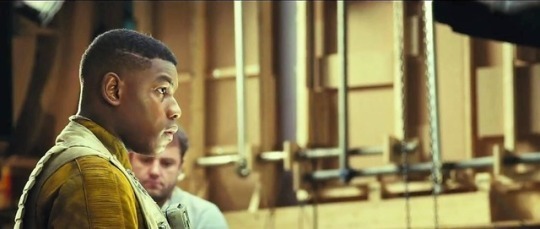
Rian Johnson rejected any and every possible character arc for Finn. Rian squandered a proactive, clearly-defined character from TFA, trying to make him fit moment after moment because he had no real big-picture idea what to do with this guy. And in light of Rian presenting himself as a progressive voice, he deserves to be challenged on why he failed a complex, heroic black character so abysmally while giving clear focus and dignity to the white male villain of the piece. (And this isn’t to say I want Kylo Ren’s character development to be worse, it’s saying I want Finn’s to be better.) But he shouldn’t just have treated Finn with care and dignity because it would’ve been more “progressive” - he should’ve done it because it would’ve made a better MOVIE.
Finn is brought to a white man, put on his knees, and is slapped in the face by said white man who once commanded him. Why? No Answers
Rian Johnson had Finn and Rose arrested and locked in a prison cell. Him and Rose are the only characters to be arrested (as in, not kidnapped by evil regime) in the Skywalker saga. PLUS they were immediately electrocuted after being pointed out to the space cops.
Rian admitted not wanting Finn and Poe together because he can't see them as two separate characters(he can't see two men of color as two different characters, let that sink in) and because in his words they "got along too well" and Rose is only there to give Finn 'conflict" We were robbed of Finn and Poe being boyfriends. I love Rose Tico as a character, but I will always want Finn and Poe to be together, aside from the amazing chemistry Finn and Poe have together and John and Oscar have together, if we get to see a gay relationship portrayed in Star Wars, it will show boys and girls who are gay that nothing is wrong with you, you are perfect the way they are and the way they love is beautiful. Oscar Isaac fought to have Finn/Poe together, he encouraged the shippers that the relationship they want is valid and supports it. And I feel so bitter after finding out Finn and Poe were meant to have scenes together in Canto Bight but were separated because Rian Johnson said “those two were getting along too well and that would be boring” aka Disney doesn’t want gay characters in their cash cow. Despite Oscar’s fight, FInnpoe did not happen and it’s a damn shame.
Rian Johnson joked about keeping Finn in a coma
Rian had a scene written where Finn was too bumbling/confused to know how to put on a tuxedo. He also had a scene where he sees alien ass unconsensually.
Finn’s suicide run. Finn knows about the weapon during his time as a Stormtrooper, so he should know full well that speeder would be destroyed trying to destroy the mini death star. Finn’s attempted sacrifice was pointless as he knew that it wouldn’t work.
Rian has Rose explain to Finn, A CHILD SOLDIER, that war and child slavery are wrong. Surely you see the issue there.
Finn almost had memories of his upbringing, but Rian chose to cut it. "In the original scene, Rose’s story of her childhood was a bit tamer and Finn shared his backstory with her, revealing a further connection between the two characters – that they both had family members taken by the First Order. Most of the sequence was reshot."
Rose stopping Finn. “that’s how we win, not by fighting what we hate, by saving what we love.” That makes no sense and ignores the entire narrative of Star Wars and heroism of the saga. Paige, her sister sacrificed herself to save The Resistance. Holdo sacrificed herself to save The Resistance. The Rogue One crew sacrificed themselves. Kanan Jarrus sacrificed himself to save what he loved.
Finn’s entire arc in the movie was learning not to just think about running away with Rey and fight for a greater cause and when the time comes for Finn to prove that he’s grown as a character, he can’t? What was the point of Finn’s arc in the movie? And let’s talk about Poe. Shouldn’t Poe be sacrificing himself? Poe has spent the entire film watching others die and give their lives and he’s never backed down, so shouldn’t Poe be in Finn’s place? And if Rose stopped Finn who would save The Resistance? We saw after Rose stopped Finn, the bunker was blown up by the battering ram. Absolutely NO ONE knew that Luke was going to make his surprise entrance and save everyone. For all we knew, The First Order would’ve moved into the bunker and killed everyone and The Resistance.
I am well aware that JJ Abrams did Finn no better, I even talked about it here. But let’s be honest, Rian didn’t know what to do with Finn and truly did him dirty.
This was really the easiest character arc for them to write. Indoctrinated Child Soldier turned Elite Soldier who after realizing what he was doing was wrong, wants to make things right, hunted by the FO for treason and because he knows too much, he slowly finds his path with the resistance and trains in the force with Rey and together they rise as the new Jedi, oh and Poe is his boyfriend.
It is my own personal headcanon that The force chooses Finn because he chose empathy for his fallen brother and chose to walk away from killing innocents.
Finn had potential to be one of the best characters we ever got in Star Wars. It’s been over 3 years since he was sidelined in the sequel trilogy and it still upsets me to this day. John really deserved better, to be marketed like this and then sidelined is just awful.
Finn in The Force Awakens: trooper number as call back to Leia, Awakening in the Force, & call to the hero’s journey/defending the symbolic hope of the Skywalker family is peak Star Wars & whatever was Abram’s original intent for Finn’s prominence in the ST; undone by studio interference because KK and China did not want a black lead.
Finn was the literal 1st face we saw when they teased The Force Awakens, it's clear he was supposed to lead the way for the future of Star Wars, criminal what they did to the character and god forbid a person of color saves the galaxy because some of ya’ll can't handle it
Finn was setup as the male lead and co-protagonist of the sequel trilogy. That’s not an opinion, that’s not a headcanon, that’s a literally fact. He was set up to be equal with Rey & Kylo’s foil and we all know why that changed.
At the start of the trilogy, we all thought people of color would have a prominent role in the new trilogy and there was a potential for the first LGBT relationship in Star Wars. But no, it’s clear that both TLJ and TROS gave us the impression that only white people can be Jedi and save the galaxy, people of color can only have secondary roles. And the blink and you miss it kiss? Only white women, not two men of color who clearly love each other.
Finn deserved to be a main character alongside Rey and Ben. He deserved a good character development, a great arc, an interesting backstory. he had the potential to become one of the most epic star wars characters. TLJ and TROS was an insult for him and he deserved better. nobody will EVER change my mind.
Finn should have been a Stormtrooper turned Jedi. It doesn’t matter that you think it tells a better story for him to not be a Jedi. “Finn being a hero who is not a Jedi is important.” Poe and Rose are great examples of ordinary heroes coming from nowhere. Rey was supposed to be a jedi related to Skywalker or Kenobi legacy while Finn was the perfect "nobody from nowhere" that becomes a Jedi. And honestly, Black kids deserved to see themselves in the Black Jedi and black kids deserved to see themselves as one of the three protagonists of the trilogy.
39 notes
·
View notes
Text
How the villians reveal the issues in the BNH society
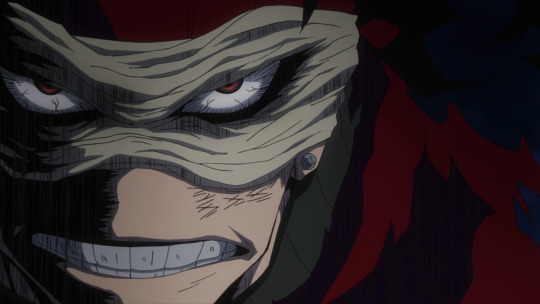
“Good deeds should be done with intention, not for attention. “
Honestly, stain was taken out of the story to quickly for my liking. I resonate with his ideology because I see it in regards to our culture. You see it on social media all the time: people recording themselves “helping” the homeless, or donating money. People must have their good deeds acknowledged and glorified.
But as I say, if you have to be perceived as a good person, you’re probably not a good person.
I think stains argument can be seen with the character Mt.Lady who comes across as an attention seeking, lazy, I’m only here so you can take my pic type of hero. What really drives her to be a hero? Is it because she can help society or is it for the fame?
And then we have the hero ranking system which I feel is the number one problem in this society. It’s a status that many strive for- like actor who only acts for the sake of getting "Academy-Award Winner” added to their title. Now theres nothing wrong with recognition, however, if your only you should strive to be the best at your craft for yourself rather than to get notoriety, that will come naturally.
And its not the heroes fault, its society as a whole that has laid out a culture that treats heroes as professional athletes. They get merchandise, riches, fans, etc.
All Might is the embodiment of what it means to be a true hero. Get the job done because it needs to, not because it will make you famous. I would like to see an OVA of the world before it got to where it is now.
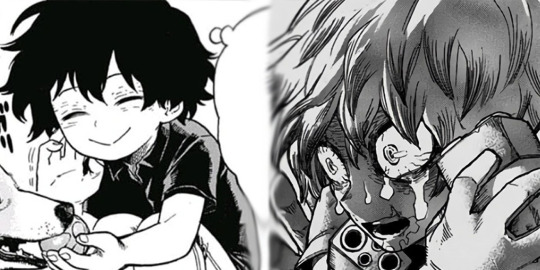
There are far too many silent sufferers. Not because they don't yearn to reach out, but because they've tried and found no one who cares
- Richelle E. Goodrich
I can’t stand child abuse and that chapter showing us Shigarakis’ back story really hit me. Here you had a little boy who wanted to be a hero and was punished by his father for that. His father abused him, and his family enabled the abuse to continue. There was no hero for Shigaraki.
No one looking out of him
No one there to save him.
You had a little boy who at first thought he was quirkless and then bestowed a very destructive power at his most vulnerable state. It was sad to see him accidentally kill his dog and ask his sister to help him after thinking he was in danger.
Then you have this child walking alone in the streets, half dead, starved, and traumatized, and no one saw him. (The old lady did, but when she saw his appearance, she moved on like it was nothing.)
No one thought to take this child to the police station? A hero didn’t see him?
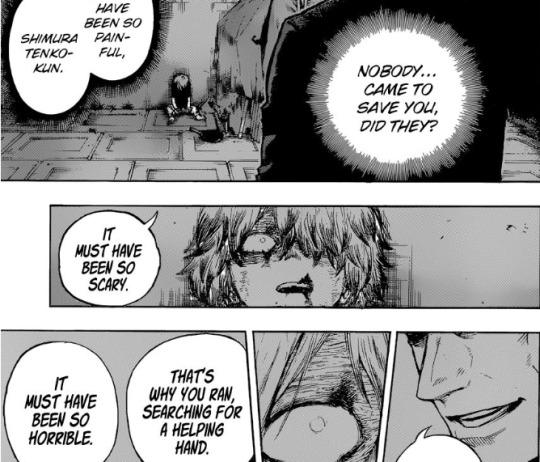
Except for All-for-One. He saw Shigaraki. He saw a broken child that could be molded and raised to be his perfect vessel.
And so he left one abusive relationship and entered another.
For a society filled with heros, there was non in his life.
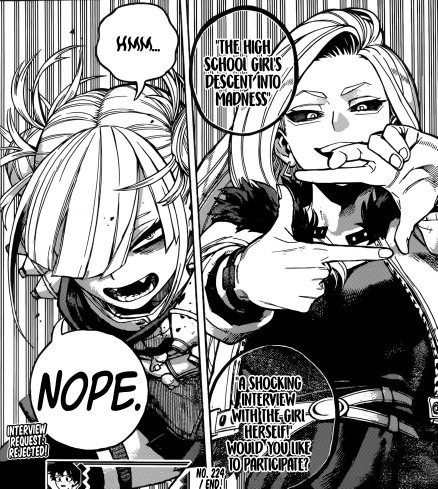
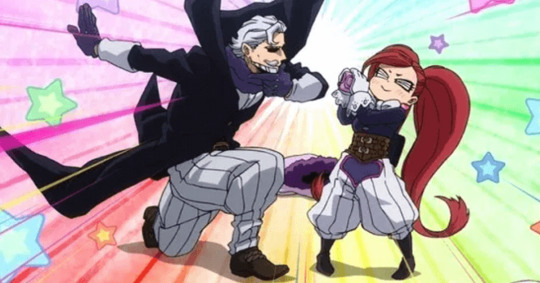
“When good people consider you the bad guy, you develop a heart to help the bad ones. You actually understand them.”
La Brava and Toga are characters that weren’t given a chance to be themselves. Both of their quirks take on an instinctual nature. Both of their downfalls happened in their school years.
Toga is naturally drawn to blood. It is blood, ones life force, that she needs to use her quirk. When she drinks the essence of someone, she becomes that person- its like the ultimate type of bonding with a person. Now, I think Toga may have had something mentally going on with her that was only amplified by her parents and peers view towards her. With positive reinforcement, consulting, acceptance of her nature, I think Toga would’ve lived a pretty normal life. If she wanted to be a hero, she would be good for stealth and spy missions.
La Brava is very similar to Toga in the obsessive nature linked to their quirk. La Brava has to know everything about a person and actually love them for her quirk to work. Her quirk is probably the best quirk to have on a support team. The teachers and her parents should have taken the time to understand her quirk (I’m sure quirk counseling exist.) and maybe have some type of quirk sensitivity class, so children can understand that not all quirks manifest in the same manner.
If La Brava had the right guidance and acceptance early on, she would be amazing to have on a team.
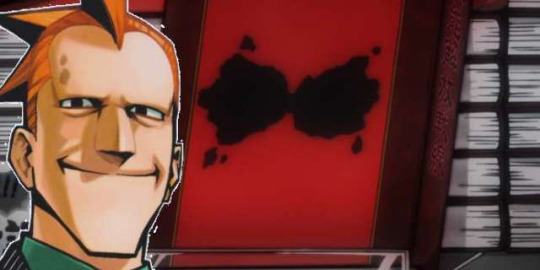
“An unjust law is itself a species of violence. Arrest for its breach is more so....
- Mahatma Gandhi
Majority of the worlds population has a quirk. It may be mundane; it may be extraordinary. They may never have to use, or the have to use it to survive.
From what I understand thus far, you have to have a heros license (or maybe other licences) to use your quirk. Using your quirk without a license is a felony offense.
But is that fair? If someone has a quirk that allows them to fly, why should they be penalized for just wanting to get around faster? If they aren’t using their quirk to cause damage and harm, then why is it a problem. Why are people punished for their ability?
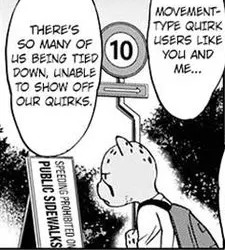
It would be no different from only professional singers signed with a label allowed to sing- anyone else will be fined.
In the MHA: Team Up Missions and Vigilantes, we get more a behind the scenes of the hero society. Vigilantes are classified as criminals even though the work they do is for good reasons. The little boy in the first team-up mission was holding the toxin of his quirk for YEARS because society forbids the use of quirks without a license.
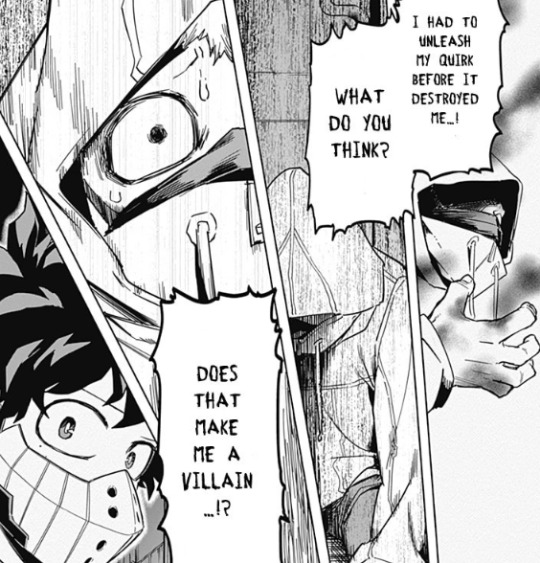
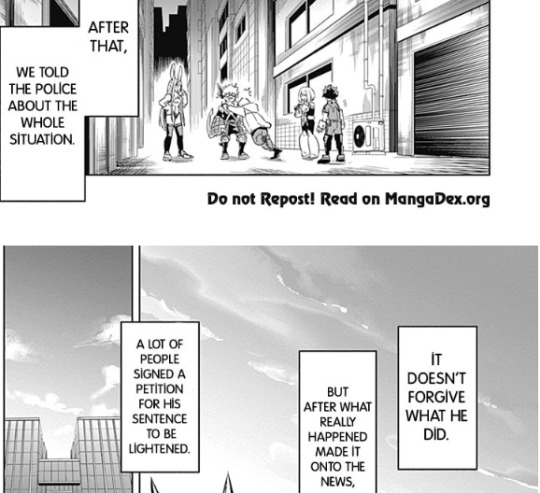
What if your quirk is always active?
So now we have the Meta Liberation Army. They believe the use of ones quirk is a human right. I agree. By standing against a system that is flawed, they have become a terrorist group. They may have well done some terrorist actions thats not touched upon in the manga.
I kinda wish they didn’t merge with the LoV. I think them being a neutral opposing force between heros and villains would have made the story more interesting.
Since it seems that Hirokoshi is releasing novels that takes a side path to the main story line, I hope to see novels that takes up back the beginning (like day one with the first person to be born with a quirk and a mutation)
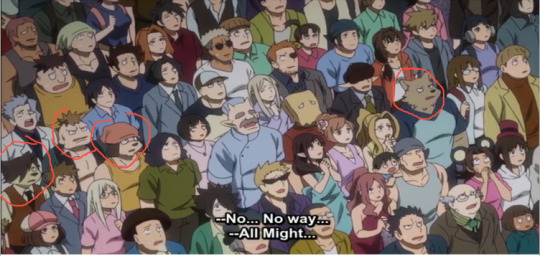
It's not at all hard to understand a person; it's only hard to listen without bias.
- Criss Jami, Killosophy
@waxwingedhawks Did a good job at pointing out mutant discrimination. I knew that spinner was ostracized based on his appearance, but some of the things that waxwingedhawks mentioned that I didn’t catch the first time around.
Even when I’m reading the story, I question when do we consider whos human and who’s an anthromorph/object brought to life?
Hawks, Miruko, and Tsuyu are people who’s quirk presents as animal traits. They look more human than animals. Then we have Tokoyomi, Mina, Kojiro Bonda, Centipede and
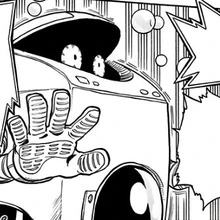
(Ok, idk if wash is really a washing machine, or thats their costume)
Who clearly are closer to being non-human that human
If Horikoshi does decide to shed more light on that topic, I would like to see that as part of Mina’s character development.
I’ve actually become disgusting engross in this world and I’m currently reading Vigilantes to pick up some more pieces on the shady nature of this society.
#bnha#boku no hero manga#boku no academia#mha#my hero academia#bnha chapter 272#my thoughts#bnha vigilantes
251 notes
·
View notes
Text
Death Stranding (PS4)
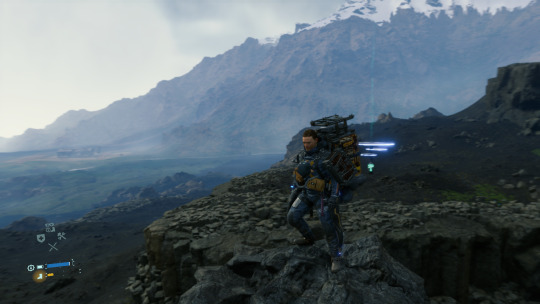
Death Stranding is the culmination of four years of anticipation and, for me, mild concern. Hideo Kojima was taken from the height of his career at Konami and the more-is-more excess of Metal Gear Solid V, and thrust in to an environment where he had - seemingly - far fewer resources at his disposal but not even the slightest hint of oversight. The years of development steadily revealed a director who was in no way financially constrained, and whose Hollywood aspirations seemed to be more heavily indulged than ever. Yet to actually sit down and play the end result is to meet a new kind of Hideo Kojima game, one that is markedly different in tone and style, which indulges his need to spell out every bit of world-building and research but which provides a structure where that content can actually be appreciated, one where gameplay expresses theme and cinematic flourishes are a garnish and a dessert rather than the core of the experience. This is perhaps the most Hideo Kojima game yet, but it is also one of his most creatively successful.
Death Stranding opens in media res in the style of the best science fiction, dropping the player in to conversations full of of unexplained but curiosity-piquing terminology that invite you to sit, listen, interpolate and reason out how the story world must work. It is, if anything, too mysterious - the player is thrust in to a mission of nation-spanning importance without a grasp of some of the more important character relationships that are supposed to motivate it - but it cultivates the mindful, steady, curious mindset that is the primary tone of the game, and it sets the you up for the explanations and background reading that will turn from a trickle to a steady flow as you progress.
The gameplay cultivates a similar sense of patient contemplation and constant observation. Sam Bridges’ movement in the game world is engagingly tactile but demands a steady and considered awareness of the terrain and his own current state. The left stick does not merely direct Sam across the landscape in the fluid, effort-free manner of the modern third-person adventure but very noticeably shifts his centre of balance. Run down-hill at a clip and you’ll feel his front-heaviness start to get away from you; ease back or even pull back on the stick and he’ll continue to descend at speed for a time but with his body more strongly centred over his scampering boots. Stride across widely spaced broken boulders and you will become conscious of the need to alternate left and right movement to balance out Sam’s inertia, lest he begin to pivot off in to a spiral and eventually crumple on to one side.
In time, this becomes second nature but never becomes automatic. The game doesn’t demand the constant, finicky persistence of a Bennett Foddy game, but nor can you simply set your eyes on the horizon. It’s the closest a game has come to the sensation of a good hike, your brain absorbed by the task of placing your feet while devising the best route across the terrain towards your ultimate goal in the distance. Even when the game gives you equipment and upgrades that make traversal easier, these are balanced such that you are using your focus in a different way, not abandoning it entirely. A rope may allow you to abseil down a precarious cliff-face and skip a lengthy walk, but the abseil itself - and any subsequent climb back up - needs care, lest you knock your backpack cargo on an overhang and send it plummeting to the ground below. Bionic legs that automatically assist your balance on rough terrain come with a dramatically reduced cargo-carrying capacity which will tempt you not to use them. Vehicles all come with jump buttons, not to greatly enhance their manoeuvrability but because of the absolute certainty you will wedge them, and their un-carryable tonnage of precious cargo, in between some boulders. (Their turning radii are even tuned so that you need to consider the best line to follow on paved highways.)
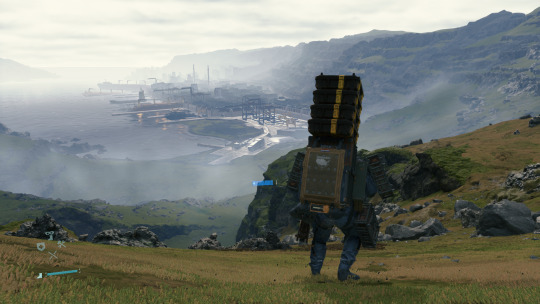
Movement itself is at the bedrock of the game’s hierarchy of goals. Your medium-term objective in Death Stranding is always a cargo delivery from one place to another, which must be completed according to certain conditions of volume of goods, speed, or cargo damage. Individual deliveries can then be manually threaded together, in the manner of Elite or any MMORPG fetch quest, in to an overall plan, which will boost your standing with multiple customers in an efficient manner. To play Death Stranding is to be conscious of the relationships between structures in space and the topography upon which they lie, and to exploit them to the best overall benefit.
This is game design and a tone which almost entirely reject conventional ideas of mastery and excellence. In Kojima’s other games, success depended upon acting with skill, speed, and excellence, but Death Stranding consistently rewards persistence, thoughtfulness, and planning, and denies you the opportunity to achieve a friction-free, graceful effortlessness. Even the game’s finale ranking system is grindable; Kojima simply does not care whether you reached your grade by doggedly completing a thousand shoddy deliveries or dramatically resolving one hundred excellent ones. A great Death Stranding player is not to be found weaving through the landscape like a death wind as in Metal Gear Solid V, but standing patiently in a river waiting for their stamina to rebuild, or contemplating the long way down a mountain rather than the swift, risky descent of a cliff face.
Which brings us to theme, and the first time in many years that Hideo Kojima has successfully communicated his game’s ideas through the gameplay itself. The core concept of connection is clearly expressed in the delivery-based gameplay, which as I’ve mentioned forces you to consider the spatial relationships between locations. The cargoes themselves tell stories about subtler connections: who might be sending which objects to who tells you about their collaboration, cooperation, and perhaps even attitudes. These connections are made concrete by your ability to build structures in the world, with each bridge or ladder or road speaking to the links between the previously-isolated denizens of the United Cities of America. These connections are in turn shared between the different players: structures and even misplaced cargo and vehicles from other players’ worlds will appear in your own, and vice versa, to be exploited, improved and recovered towards your now-shared goal of reconnecting America.
The game reinforces at every stage that you must collaborate to succeed. Structures are expensive, particularly in the early game, but by sharing with others you can create a better, less-frustrating and more survivable world. Hiking through the snow and rounding a hill to find another player has built a refuge for your cold, wet, hungry Sam is like spotting a warm cafe window on a cold and lonely evening. You will be rewarded for, and you can reward, this altruism: the sending kudos every time I come across a rope or ladder has conditioned me to smash the like button on every social network I use with a ubiquity and enthusiasm that I was sure had been washed away by cynicism. This may be the best and most positive argument yet that games have the capacity inherent in all art to influence people’s thoughts and behaviour.

Kojima’s newfound emphasis on thematic gameplay has not tempered his love of narrative exposition, but it does fit Death Stranding better than his previous, more action-oriented games. The opening couple of hours and the finale are exposition-heavy cut-scene-fests in a universe full of vaguely human ciphers with motivations that are relatable yet communicated entirely through exposition. (There’s some remarkable Hollywood talent here doing its best to sell it, but the scenes focused on each character are, enjoyably, completely incongruous with each other, like a low-key Spider-Verse treatment.) But for the bulk of the game, all eighty contemplative hours of it, the player is left largely to their own devices, with the scene-setting and research-regurgitation coming almost entirely in the form of text dumps. In Death Stranding, more than any Metal Gear Solid game, there is time to mentally unpack the ideas about human connections Kojima is lecturing you about, and a setting and goals that actively encourage you to consider the implications. As narrative fiction it’s unsubtle, with cloth-eared dialogue and a bias towards expressing its ideas verbatim rather than through the characters, relationships, or even much of the plot, but viewed as part of a game, and of this game, it actually works well.
There is actually an idea I’ve been toying with, since Tim Rogers made the case that Hideo Kojima writes non-fiction, that perhaps he is a creator of edutainment games: that the nearest analogue of something like Death Stranding or Metal Gear Solid 2 is not Stalker or The New York Trilogy, but Crystal Rainforest or Granny’s Garden, or I guess Where On Earth Is Carmen San Diego (we never had that here, but we got the TV show), a game where you’re given a great deal of non-fiction knowledge in an enjoyable, interactive environment. True, Death Stranding lacks quizzes to test you on your acquisition of the knowledge, but I think that’s probably the least important part of any edutainment game’s design. I made the joke recently that Hideo Kojima spent one hundred hours reading about the words, concepts, and objects related to the English word “hand”, and by golly he’s going to make you sit down and do the same thing, but I’m not sure it was entirely a joke, or that it’s particularly negative for the game to work this way. Perhaps Death Stranding is the world’s greatest multimedia educational experience. Perhaps Hideo Kojima should just start giving TED talks and get it all out of his system.
Death Stranding is entirely itself in a way only an indie game or a Hideo Kojima production can be, and was destined to be divisive. Its patient, mindful pace and resistance to streamlining are bound to frustrate those who approach games as sport, and its needlessly convoluted plot and casual disregard for narrative will turn off those expecting an interactive movie from the supposed master of the form. But the past few months of going for long, productive hikes in the mountains, surrounded by ghosts and rewarded by lectures about puzzling scientific curios, has been a genuine pleasure.
A modern classic.
9 notes
·
View notes
Note
A minor plot point of my story involves the mc getting in a qpr with his aroace friend. I’ve thought a lot about making sure not to break the aroace chara’s boundaries, but I’m slightly worried I might be overlooking the mc’s desires? If the aroace chara doesn’t want to do things like have sex/kiss but those are things the mc would want from him, would it be wrong to put them together? The aroace chara encourages the mc pursuing other people for those things. Is that good enough?
So, I’m not going to make a definitive statement as to whether putting these two characters into a qpr would be ‘wrong’ or not. I also can’t give much specific guidance as I haven’t read your story and this is a very nuanced topic. (Which isn’t your fault, I’m just explaining why my answers might seem vague) What I can do is give some pointers, and poise some questions of you that might help you figure out if this is a healthy dynamic.
I’ll be addressing the aro side of things obviously as this is an aro character advice blog, but you can go to ace blogs for more info on that, and to be honest most of the advice I’ll be giving can likely apply to both areas.
Ok so first off: You sound like you want to respect the aro character, and not have the mc pressure them, which is a very good start! But I feel like you may still be viewing the dynamic as one where mc wants something, the qp can’t give it, and his boundaries are a problem that need to be solved, just with another relationship in this case rather than ‘curing’ the aro or having them give in.To be honest this is probably on some level because the mc is the main character. As a writer, you tend to think in terms of your protagonist’s goals.
(also, as a note, if you were at all thinking about having the qp giving in and kissing the mc anyway, unless this is portrayed as very very negative, Don’t Do That for the love of positive representation)
Anyway! Please, please be clear in your writing that one person looking for a certain thing out of their relationship, and another person not looking for it, doesn’t mean the first person is hard done by and suffering horribly by compromising. It’s simply a matter of incompatibility in that area.
Especially when the situation with your characters is that one wants romance, and the relationship is queerplatonic. It’s an explicitly purely platonic relationship style! This isn’t a case of person A ‘overlooking’ their desires because of person B, this is a case of person A entering a relationship they know full well will Not be romantic, still feeling unsatisfied because it’s not romantic, and person B having to suggest solutions to something that isn’t technically a problem. Imagine getting frustrated with a waitress because they wouldn’t kiss you. Why would you expect them to? A qpr isn’t a romantic relationship with one ‘faulty’ partner. Don’t treat it as such.
(It’s a bit of a different situation with sex, as qprs can be sexual, but that’s not my area)
Sure, some qprs have more romantic coded elements, but they’re not an expectation. If you’re going to write a qpr, please understand that actions within them are on an equal playing field. kissing and having sex have no more inherent value than holding hands or watching a movie. It’s about what individuals want.
I’m also not trying to say that your mc doesn’t matter. Just that your bias could possibly be tipped towards him. He is compromising by not being able to kiss his qp, and the qp is probably compromising in a bunch of ways too. Maybe the qp wants to live together or get a dog or matching tattoos or go to heavy metal concerts together, and the mc doesn’t. There’s Stuff like that in all relationships, you just need to start also viewing romantic coded activities as Stuff, only with more cultural baggage.
On the topic of the mc having another partner: that sounds to me exactly like a compromise on the qp’s part. Did he go into this relationship wanting it to be polyamorous? Because it sounds like this is something he’s doing for the mc, especially as you say this is about the mc specifically having other partners, not the two of them as a couple becoming open. Even if the qp is enthusiastic about it, doesn’t mean it’s something he particularly wanted out of the relationship, just like the mc didn’t particularity want a non-romantic relationship.
I would also question you as to why the qp is enthusiastic, and whether that’s a character choice or something you’ve done to benefit the mc. Maybe examine whether you have a negative gut reaction to the mc not seeing someone else for kissing/sex, and if so, work on unlearning that. I’m not saying that in your specific situation, the qp must feel pressured or not good enough, but it does happen and it’s worth thinking about how aros would feel seeing a character they’re meant to identify with happily telling their partner to see other people for desires the aro can’t fulfill. I know I personally would feel uncomfortable with it unless it was really well written, as I’ve been in a similar situation myself.
Again, some people are fine with letting their partner do that kind of thing, or are polyamorous in the first place, but I would be very very careful about how you present it, (other aro blogs, and the qpr tag, may help) and consider whether it makes sense for the qp to feel this way based on context and their characterization.
I hope this hasn’t sounded too harsh. I’m very aware that you could have considered all this already, but I feel like I need to cover a lot of ground because I don’t know specifics about your characters and this is a stupidly complicated topic.
A few things to consider adding in or developing further:
Both partners entering or being allowed to enter other relationships. This might change the tone from ‘aros aren’t enough so my mc needs someone else to make up for it’ to ‘no one person has to fulfill either character’s desires!’.
Having the mc realise that he doesn’t actually don’t need to date someone else. Not in a way that reinforces toxic monogamy or the idea of soulmates, but presented as him just working through amatonormativity and decided he’s cool without kissing anyone.
Showing what both characters get out of the relationship, rather than just what the mc doesn’t get. For instance maybe there’s a show just the two of them are into, or the qp buys the coolest presents, or if one is home late the other always waits for them to start eating dinner. Just small things that present them as good for/happy with each other rather than focusing on the one area of incompatibility.
Showing why the qp wants to be in this relationship. I think this would help aro readers feel comfortable, as it’s kind of opt in for aros to date as opposed to alloromantics assuming they will, if that makes sense. We also, as a community, tend not to value our own goals and wants. Does he want that partner label to be able to easily explain what the mc means to him? Making that explicit would probably make him more relatable, and help stop aro readers projecting discomfort onto him. Explaining what makes the relationship fulfilling for him would also show that he doesn’t have to lower his expectations just because he’s not willing to be in a romantic relationship.
You don’t have to employ all or any of these ideas to make the relationship work, I just wanted you to have some options if you read my earlier advice on what not to do and though ‘heck, I did do that though’. You might also want to get some aro sensitivity readers to go through some later drafts of the story, though do be aware that some aros would be uncomfortable seeing an aro character in any kind of relationship. Not every aro will want to read what you write, but that’s ok so long as you consider those who will.
tl;dr: Don’t show the aro character’s boundaries as a hurdle, just a different relationship expectation than his partner. Consider why you’re writing the aro character the way you are, and take into consideration what they both enjoy about their relationship.
Good luck! And I’m so sorry for the long post!
- Mod Kaladin
24 notes
·
View notes
Text
Starmyu S3 episode 9 review
This episode was interesting to say the least. In my last review I said that maaaybe tatsumi is feeling the pressure from team hiragi not being the only ones considered as the next Kao Council candidates. Well, that wasn’t exactly right, but it turns out tatsumi is indeed feeling pressured by this situation. Or should I say, by hoshitani (or his talent)? I was surprised to see him admit he felt resentment when seeing hoshitani’s growth as a performer. However, I can’t really blame him as he is a very competitive person and we already know how stubborn he can be, so… Besides, he has no bad intentions. He just honestly wants to fight with hoshitani and there’s nothing wrong with that.
It was nice to see tatsumi takes his rivalry with hoshitani very seriously, he even finally admitted to him (and to himself) that hoshitani has a lot of potential and that he is glowing more than ever.

One thing I loved was that we finally got to see hoshitani’s wings!
Going back to the main topic, I think team hiragi has a lot of courage to change their decision now, when opening ceremony is closer than ever, and I admire them for that. For being able to take that decision together as a team. This is probably the first time we’ve seen team hiragi like this. I already knew they had a strong bond, but it was never really developed before.
Still, as much as I enjoyed the episode, I have some mixed feelings about it. I respect tatsumi’s decision and I am curious about how his fight with hoshitani will end, but I can’t help but feel fuyusawa won and I don’t like that. I don’t hate fuyusawa, but he needs to stop believing he is always right and stop prioritizing his feelings over the Kao Council’s ones. At the very least, I’d like him to stop saying he is doing this for the Kao Council’s sake.

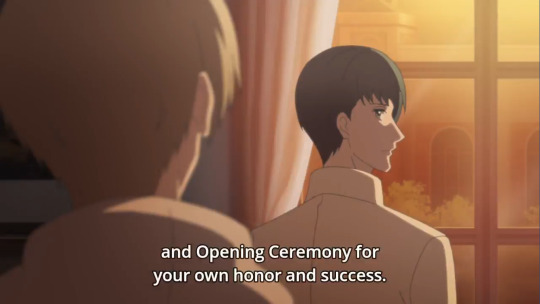
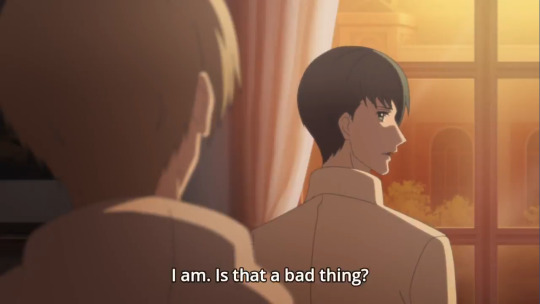
He admitted to tatsumi this was all for his own sake, so why pretend otherwise in front of the others?


So now he is worried about school traditions? I don’t get it. Didn’t he want to change the system?
Team hiragi’s decision only reinforces what fuyusawa was thinking. We can actually see chiaki is officially done with fuyusawa after the credits scene. Buuut hoshitani and team hiragi competing might actually be a good thing. Why? Because it gives the others the opportunity to prove they are by no means inferior to team hiragi. Also, this is my personal bias, but hoshitani will most likely shine even more at the end and that is something I really want to see. Of course, it’s the same for the others. They are all very talented individuals and I have no doubt they will also impress the students/Kao Council members. As a hoshitani fan I want him to shut up all those who didn’t believe in him and prove them wrong. I love him, alright? Anyway, what better chance than this? If hoshitani and the rest manage to win or to tie against team hiragi, fuyusawa will be left with no other choice than to accept them. I really want to see that.
Now I’ll talk about other things I liked:
- Kasugano defending shiki. He seems like the quiet type, but he isn’t afraid of standing up for what he thinks it’s right (and for his loved ones/friends).
- Hoshitani, eigo and nanjo noticing something is wrong with tatsumi (though, I guess you could say the same about the rest of team hiragi).
- Tatsumi and hoshitani’s fists finally touching. The sense of distance has finally disappeared. They are now equals.
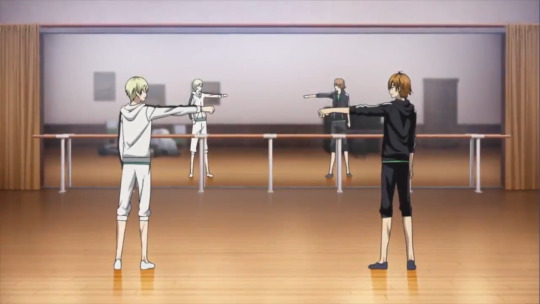

This scene shows how much they both have grown and how tatsumi is now officially acknowledging hoshitani as his rival and as a possible treat. I remember him saying in previous episodes that team hoshitani was not yet at a level they could be considered as “true rivals”, but now things have changed.
- I decided to conclude this by saying I love how optimistic hoshitani is. Instead of taking it badly, he saw the bright side of things and I am sure his enthusiasm will be fundamental to motivate the rest who might (or might not, in nanjo’s case) be confused by what just happened.
22 notes
·
View notes
Text
Negativity... (2.9.19)
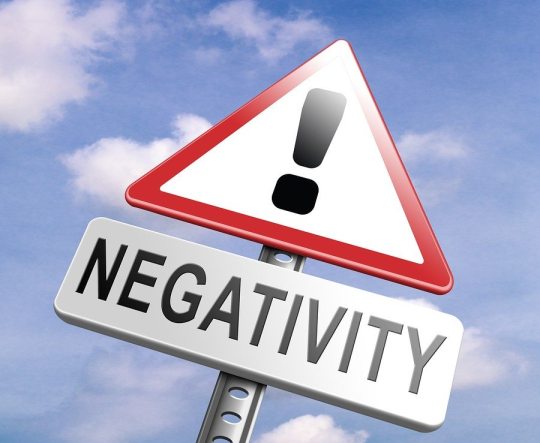
If you're anything like me, you'll know that sometimes your mind can be your own worst enemy.
Most of us have times that our mind can't settle - times when we're prone to making just about every 'thinking error' in the book. Catastrophising, jumping to worst conclusions, making generalisations that are unhelpful, being highly self-critical etc. We might find ourselves increasingly focusing on the negative side of life and feeling pessimistic.
When this happens we'll often give more thought to negative situations in our lives. We might think of all the things that could go wrong at work next month, or dwell on the times we've been treated badly in the past. Then it's easy to get stuck in a loop of unhelpful thinking. Roughly speaking, when you focus on the negative, your mood becomes lower, and so you focus more on the negative things. Boom...
The human brain has an inbuilt bias that tends to veer towards focusing on 'negatives', and this is just part of how the human brain seems to work. We also have a tendency to notice the bits of information that support our state of mind (and so 'the way we see the world'). This means, for example, that if we are in a bad mood we're more likely to remember any unfriendly interactions when we visit our local town. Dwelling on these unfriendly interactions will reinforce our low mood and may reinforce an idea that "other people are rude to me", and over time this becomes a fixed prediction for how people are likely to treat me in future. (And so our negative predictions begin to colour future interactions).
In scenarios like this, friendly social interactions are more likely to be ignored, and we'll assign more focus and attention to the negative experiences we have. These become 'proof' of our theory about others.
This kind of inbuilt cognitive bias plays a big part in therapy too. In therapy sessions sometimes people will say "I want to be happy" - something I can definitely understand. But it is a fact that our brains are not evolved to produce happiness but to focus on survival. Problem-solving has been the chief concern of the human brain for all of our evolutionary history. The main goal of the brain is to solve potential problems, to automate tasks and take the need for conscious thinking out of as many of our daily tasks as possible, and to make 'predictions' to ensure we survive.
This means we have natural default settings in our minds that ensure we allocate much more attention to problems than we do to situations which go according to plan. It is because of this tendency to focus on solving problems (above, say, counting our blessings), that our perceptions of the world can become quite skewed, often to the pessimistic side of things.
Hans Rosling (a Swedish researcher) quite famously demonstrated this tendency in a piece of research in 2013. His research asked the question: " Has the percentage of the world population that lives in extreme poverty almost doubled, almost halved or stayed the same over the past 20 years?" Only 5% of respondents correctly answered that poverty has actually halved. Our bias towards pessimism or a negative appraisal of situations sometimes means we can be really, really wrong... In fact, this is the case with almost every quality-of-life metric. Things have improved so much in the last fifty years, and yet the sense of pessimism remains high.
Like moths to a flame, we seem to be particularly drawn to 'problems' in all forms. In 2014 a study at McGill University examined people's consumption of written news media and looked at the stories participants chose to read in what they thought was an eye-tracking experiment. What the results showed was that even the participants who said they wanted more good news stories were much more drawn to 'negative news content'. And in the absence of any sizeable problems, our minds will often work overtime to create some new ones - to find some new angle, some new (hitherto unimportant) issue on which to rest our attention and focus our concerns.
This is partly due to "prevalence-induced concept change", a theory that suggests that as the prevalence of a problem is reduced, humans are naturally inclined to redefine and broaden the nature of 'problems' themselves. This means that as things improve all around us, our definition of 'bad news' is just widened to find new things that are bad to report on. We recast our 'problems' and simply discover a load more of them. I suppose this is far more common in the developed, capitalist, liberal West (where to some extent the 'problems' that have made life miserable for countless generations before the last several have now been solved) than in developing nations. And so we see a recasting of 'problems' in new and unresolvable directions, one example being the current obsessional focus on 'identity politics'.
Closer to home, I recently spent many hours looking at YouTube reviews for a new iPhone, obsessing about a choice between LCD or OLED screens as though something serious depended on my choice (both screens are far better than anything remotely possible even five years ago - and both are effectively identical to the normal eye). Perhaps it fills the time in the absence of survival-critical problems...
We are also subject to something called "availability bias". This bias was noted in a study by Tversky and Kahneman in the 1970's, whereby respondents seriously overestimated the frequency of crime, due to the overwhelming reporting of crime on the news. Random violence or sudden, explosive bad things make the news because they shock and happen suddenly. Good news - such as acts of kindness - are common and tend to form part of the clement background conditions in which life unfolds. The good news doesn't have the power to make a sudden splash that changes perceptions that, say, warfare, accidents or disasters have. Bad news is sudden and explosive, and so is exaggerated in our minds. Real tragedies are thankfully rare, but never in history has each tragedy had such global coverage.
So, bad news arrives in ways that are far more eye-catching than good news. Then our mind focuses on problem-solving in ways that exclude more positive appraisals of the situation. In evolutionary terms, it simply makes sense for us to dwell more on risks.
Add to this that people tend to think in relative and not absolute terms. It matters how you are doing compared to others around you, far more than it matters how you are doing in a general sense. This is why, whatever goal we reach, we experience a short burst of euphoria before quickly resetting and then taking for granted our new situations. It's why, for example, acquiring a new car only brings temporary satisfaction, before the problem becomes, say, a small scratch we've noticed on the rear bumper. It's why a big promotion and pay rise quickly leads to wondering whether the person next to you was given an even bigger pay rise. When things get better in our lives, this relativizing behaviour means we quickly reset our expectations and focus on the next set of problems.
During my years trading derivatives, I remember we would leave the trading floor and go to one of the pubs in Leadenhall Market after the close of the trading day. One topic always came up - "losing trades". You'll always find traders talking at great length about losing trades. In fact, many traders remember their losing trades and losing days for far longer than they remember profitable days. It's the days that everything goes against you that stick in your mind.
This is a long way round of saying that it's actually very hard to overcome your tendency to dwell on the negative side of things! People often say "I don't want to feel so negative about everything", and it's useful to understand that your brain is doing what it is evolved to do.
But this can be debilitating if it runs unchecked. We can try and counter this tendency and bring some balance to our inner-lives, and it is possible to take steps in this direction. There's lots of way of approaching this, but here are some questions you can ask yourself if you find yourself stuck in a cycle of negative thinking. You can check your thinking by asking:
Where is the evidence for my belief(s)?
What impact is this way of thinking having on me?
Am I jumping to conclusions?
Is there any evidence to disprove my belief?
Am I concentrating on my weaknesses, and neglecting my strengths?
Am I taking things too personally?
Am I thinking in all-or-nothing terms?
Am I overstating the chances of something bad happening?
Am I predicting the outcome instead of experimenting with it?
Am I expecting total perfection?
Am I being open to evidence that 'disproves' my worst fears?
If I had to come up with a more balanced/helpful belief, what would this belief be?
If you have a problem situation in your life, you can try sitting down somewhere and taking twenty minutes to write out answers to these questions. Really explore your own style of thinking. If you spend some time doing this, you'll begin to condition yourself to avoid getting stuck in a spiral of negative thinking and hopefully more able to take a balanced view of your life.
www.whitestonetherapy.com
1 note
·
View note
Photo

WT: It's not a hard concept to consider...I mean....when you look at both character you can see a real 'two sides of the same coin' situation playing out. I out and out had Judy come to that conclusion in “The Rehabilitation of Dawn Bellwether”. So really all we'd have to do is...flip the coin.
With Judy and Dawn swapped, I think you'd see very little difference in the way things would play out aside from the fact that you are losing the 'natural enemies' angle that the Nick Judy dynamic forms. Even if we were to go as far back as placing Dawn in Judy's childhood, with Gideon as her bully, I still think that fear of foxes would be a less prevalent due to the whole 'natural foe' angle. Giddy would just be some non-specific pred bully. There's also less parental reinforcement of 'watch out for foxes'. And as for Judy growing up in Dawn's place well...outside of my AU we've got little to go on when it comes to what she endured growing up. Only hints that Lionheart and others took advantage of her, and treated her like she was a servile slave at best and luggage at worst.
For the sake of the thought experiment, we'll go pure movie basis since unlike the other one, Vernon wasn't mentioned in the question. With Judy in Dawn's roll, there is little that changes in her plot arc. She's pushed around by Lionheart, forced to have an office in a boiler room, (because presumably, no one would ask for that.) So she hatches the night howler plan, and goes forward with it. Maybe she works with rabbits instead of rams, but it still plays out largely as expected.
As for Dawn, well growing up in Bunnyburrow, her parents are naturally pred fearing to an extent. But they probably spend more time warning her about wolves over foxes. Gideon's bullying is still present but makes less of an impact. As such, while doing her traffic work in Zootopia, Nick's activity doesn't arouse immediate suspicion. Granted, he is a fox, but those fox stereotypes aren't as baked into Dawn as they would have been in Judy. So we have to move to a later scene where Dawn spies Nick pouring the ice cream down the roof in Sahara Square or something that gets her to start tailing him. However, I imagine Dawn questions him earlier than Judy, and is satisfied with Nick's permits even if he does mock her poof.
Later, things play out from as normal. Dawn recognizes the pawpsicle from the picture, and after a bit of arguing, and eventually Dawn agreeing to pay him for his help and information in the case, Nick goes along with her. The running gag being that Nick keeps getting her to agree to double the price in order to go along with the more egregious and dangerous situations. Along the way, a similar friendship develops, which leads to Nick standing his ground for Bellwether when Bogo dresses her down.
After Lionheart is caught and discovered, and Dawn is asked to speak at the press conference, the ewe nearly makes the same blunder as Judy does. But without the baked in extra fox prejudice, the ewe avoids making certain inflammatory statements which keeps Nick more or less on her side, and slows the escalation of the Night Howler Predator frenzy. Nick begins his enrollment at the ZPD shortly after this while the Night Howler scandal continues, the public becoming increasingly fearful of predators in the process. Meanwhile, Dawn is made the face of the ZPD. But despite all the accolades and fanfare, Dawn can't shake the unfinished feeling the Night Howler case carries. In Muzzle time chats with Nick she vents her frustration over the 'illness', and how the more she goes over the case notes, the less sense certain aspects of the case make. Nick tells her she needs a vacation, and that ends up taking us back to Bunnyburrow.
While in Bunnyburrow, the case still won't leave the ewe, and she ends up taking frequent walks around town while mulling over the facts. It is only when she bumps into an old adversary turned portly pie seller Gideon Grey while the fox is delivering some pies to some local bunnies, and strikes up a conversation with the mammal, does she find out about night howlers and makes the connection.
From there she rushes back to Zootopia, grabbing Nick on the way saying that 'She needs his help to finish the case they started', to which Nick once again asks her jokingly to 'double his fee', the pair set off and the movie plays out the same way up until the end.
As for the friendship with Nick that Dawn ended up forging? Well I could only really see it as going as far as friendship. Perhaps it's my pairing bias, but I think they just...fit less. Even if Judy and her aren't so different. Without Vernon in the picture, I could see Dawn ending up with someone like Gideon though. That is, if Sharla hadn't staken her claim by then. Lol.
#Zootopia#askdawnandvern#ask blog#judy hopps#Nick Wilde#Assistant Mayor Bellwether#dawn bellwether#wastedtimeee#gideon grey
14 notes
·
View notes
Text
Hey Lady. How Old Are You??

My name is Tanya. I am 31 years, 7 months and 25 days old.
I was born in 1987. I grew up with Cabbage Patch Kids, Loonie Tunes, and Polly Pocket (version 1.0); and when I was 10 I wanted to be (or meet) a Spice Girl more than I wanted anything else in the whole world.
Everything they said about your 30s is true. It’s way more gooder than the other ages I’ve experienced. (Except 7. I really loved 7.)
I’m entering this era of my life where I feel more confident. I have better friends and deeper, more meaningful relationships. I can say no to things that need to be said no to, and I have a handle on drawing healthy boundaries. On the flip side, I’m also noticing a new-to-me trend: more and more frequently my peers, more prevalently women, are starting to become more illusive about their age.
I can’t begin to tell you how much this bums me out.
Don’t get me wrong, I understand aspects of this choice (which I’ll get into a little later here), but even still, I just can’t get on board with it.
I love being 31. I have never felt more sure of who I am as a person. I feel acutely aware of my traits, for better AND worse. I have so many tools to manage the various challenges that come my way. I am wittier, my sense of humour is more developed, and I am quicker to retort in a debate. I know myself, I have opinions and I’m less afraid of sharing them. I am less concerned with being considered a threat when I share my point of view - and yet I am also simultaneously more compassionate and aware of my language when I do. I have an accumulation of knowledge and experience that has served me very well, and I have more opportunities to share from those experiences than I ever have.
I am also under the belief that this will continue. As I continue to age I will accumulate more understanding of the world, myself, and the people around me. [Insert cliche-meme about wine and women getting better with age blahblah.]
To those of you that choose not to disclose your age, I want you to know that I have compassion for that choice, and my intention is not for you to feel judged or called out. I understand that the culture and society we live in may treat you with certain bias based on the age grouping it puts you in. (Isn’t that awesome? How we’re all put into GROUPS. Just love that. Sarcasm-font, where are you when I need you?) I understand that this choice may make you feel more accepted. Or even more confident. Whatever your reasons may be, they’re yours. And they are entirely valid.
It doesn’t change that I can’t help but hope that less people will make this choice. By hiding our age, we’re reinforcing and agreeing with society that our age is something to be ashamed of; and that our value is tied up in our physical appearance and youth.
Naturally this hide-your-age mentality is ever-present in the entertainment industries. It seems there is this looming deadline; this unspoken belief that an (female) artist (or actor or dancer…or or or…) can’t ‘break’ if they are 30 or older. So naturally, staying in the youth bucket lets you a bit more time to pursue your dream. And this is exactly where you lose me.
NO! People. BE BOLD. Be something new, and different. If you don’t think the industry has room for an artist over 30 to break. Then BE the artist over 30 that breaks. Don’t be another 20-something year old. They have a butt-load of them already. (Note: No disrespect (or ‘shade’ as you call it) to you 20-somethings. I love you. Muah.) BE YOU! Be the 40-something year old that breaks. Hell, be the 50 or 60-something year old that breaks. Try to convince me that you should put an age limit on your ambitions, it won’t work. I don’t stop working at the things that fill my heart because society doesn’t approve of my age.
Continuing to hide our age silently condones all this societal behaviour. It silently condones that we are of more value for our appearance and others’ perception than we are for our experiences and our knowledge. It reinforces that our value is wrapped around our aesthetic, and our ability to be ‘care-free’ and ‘fun’. (Because we are predominantly fun in our twenties? Is that it?)
Here’s what. Be aesthetic, be care-free, be fun! AND be opinionated, be deep, be expressive. Have values and morals you fight for and stand by. Use your voice, your heart, and your body.
What a world it would be if we saw the true depth in women. These amazing beings that have vast array of amazing characteristics: Beautiful, powerful, compassionate, funny, charismatic, loving, nurturing, fierce, intelligent. What poetry and symbolism it is that these same incredible beings are the source of all human life. (Shout out to the men for your (very) small contribution.)
Celebrate your life. Celebrate your age. You have had this amazing privilege to live a human life; each year being this beautiful gift that some don’t receive. Each passing decade offers this glorious opportunity to give less f**ks than the previous; To focus on what are the truly impactful parts of life and recognize how much choice and power you have in your own life. We GET that people. We GET to age. We GET to give less f**ks. We GET to CHOOSE our life!
No matter how young you look, or you act; or what your job is, or if you go to school; how old your kids are, or if you don’t have kids. Whatever reason you hide your age, whatever your justification; BE your age, and teach society that your age doesn’t designate what you can accomplish or act like or become. Whatever your reason may be. Put it in front you and PROVE IT WRONG. Be brilliant. Be radiant. Be you.
Okay. Maybe I’m getting a little too #inpso here, and if I’m gunna keep this up I’m going to have to change my name to Tany Rybbins. Or something. (In case you missed it, that was a really really poorly executed joke attempting to compare my previous paragraph to the work of Tony Robbins.)
The point of the story is - ain’ no shame in your aging game. Being that it is inevitable and completely unavoidable. So go act your shoe size; regardless of what your birth certificate says.
4 notes
·
View notes
Text
Five Potential Side Effects of Transracial Adoption
by Sunny J Reed
A trans- anything nowadays is controversial, but one trans- we don’t hear enough about are transracial adoptees. This small but vocal population got their title from being adopted by families of a different race than theirs — usually whites. But adoption, the so-called #BraveLove, comes with a steep price; often, transracial adoptees grow up with significant challenges, partly due to the fact that their appearance breaks the racially-homogenous nuclear family mold.
I am transracially adopted. My work is an outgrowth of my experience, research, and conversations with other members of the adoption triad; that is, adoptees, birth parents, and adoptive parents. This piece is a response to the misunderstandings and assumptions surrounding transracial adoption, and I hope it brings awareness to some rarely-discussed side-effects of the practice. While this isn’t an exhaustive list, by any means, these are just a few of the struggles that many transracial adoptees grapple with on a daily basis.
1. Racial Identity Crises, or “You Mean I’m Not White?”
Racial identity crises are common among transracial adoptees: what’s in the mirror may not reflect which box you want to check. I grew up in a predominantly white town that barely saw an Asian before — let alone an Asian with white parents. Growing up, I’d forget about my Korean-ness until I’d pass a mirror or someone slanted their eyes down at me, reminding me that oh yeah, I’m not white.
There’s a simple explanation for this confusion: “As members of families that are generally identified as white,” writes Kim Park Nelson, “Korean adoptees are often assimilated into the family as white and subsequently assimilated into racial and cultural identities of whiteness.”
Being raised in an ethnically-diverse area with access to culturally-aware individuals would help keep external reactions in check, but still belies the race-based role you’re expected to play in public. Twila L. Perry relates an anecdote illustrating the complexities of being black but raised in a white family:
“A young man in his personal statement identified himself as having been adopted and reared by white parents, with white siblings and mostly all white friends. He described himself as a Black man in a white middle-class world, reared in it and by it, yet not truly a part of it. His skin told those whom he encountered that he was Black at first glance, before his personality-shaped by his upbringing and experiences-came into play.”
Positive racial identity formation might be transracial adoption’s greatest challenge since much of the dialogue related to race and color begins at home. Multiracial and interracial families sometimes have difficulties finding the language to discuss this problem, so it’s an uphill climb for transracial parents (Same Family, Different Colors is a great study on this).
Parents can begin by talking openly about their child’s race. Acknowledging differences is not racist, nor does it draw negative attention to your child’s unique status in your family. Instead, being honest about it places your child on the path to self-acceptance.
2. Forced Cultural Appreciation (à la “Culture Camps”)
Picture culture camp like band camp (no, not quite the band camp talked about in American Pie). The big difference is that, unlike band camp, culture camp expects you to learn heritage appreciation in the span of just one week instead of how to better tune your trumpet. Sometimes adoption agencies sponsor such programs, designed to immerse an adoptee in an intense week or two of things like ethnic food, adoptee bonding, and talks with real people of your race, as opposed to you, the poseur.
These camps often get the side-eye — and rightfully so. Critics argue that “fostering cultural awareness or ethnic pride does not teach a child how to deal with episodes of racial bias.”
Much like part-time church-going does little in the way of earning your way to the Pearly Gates, once-yearly visits with people that look like you won’t make you a real whatever-you-are. I know culture camps aren’t going away, so a better solution would be using these events as supplements to whatever you’re doing at home with your child, not as the sole source of heritage awareness. And yes, racial self-appreciation should be a lifelong project.
3. Mistaken Identities -aka — “I’m Not the Hired Help”
Transracial adoptees’ obvious racial differences provoke brazen inquiries regarding interfamilial relationships. Having “How much did she cost?” and “Is she really your daughter?” asked over your head while being mistaken for your brother’s girlfriend does not contribute to positive self-image. It publically questions your place in the only family you’ve ever known, setting the stage for insecure attachments and self-doubt.
Mistaken identities aren’t just awkward, they’re insulting. Sara Docan-Morganinterviewed several Korean adoptees regarding what she describes as “intrusive interactions,” and found that “participants reported being mistaken for foreign exchange students, refugees, newly arrived Korean immigrants, and housecleaners. [One adoptee] recalled going to a Christmas party where someone approached her and said, ‘Welcome to America!’”
Obvious racism aside, transracial adoptees often find themselves having to validate their existence, which is something biological children are unlikely to face. Docan-Morgan suggests that parents’ responses to such interactions can either reinforce family bonds or weaken them, so expecting the public’s scrutiny and preparing for it should be a crucial piece in transracial adoptive parent education.
4. Well-Meaning, Yet Unprepared Parents
Sure, they’ll be issued a handy guide (here’s one from the 1980s) on raising a non-white you, but beyond a few educational activities and get-togethers with other transracial families, they’re on their own (unless online forums count as legitimate resources).
Some parents may good-heartedly acknowledge your heritage by providing dolls and books and eating your culture’s food. Others may mistakenly adopt a colorblind attitude, believing they don’t see color; they just see people. But, as Gina Miranda Samuels says, “Having a certain heritage, being given books or dolls that reflect that heritage, or even using a particular racial label to self-identify are alone insufficient for developing a social identity.”
Regarding colorblindness, Samuels explains that it risks “shaming children by signaling that there is something very visible and unchangeable about them (their skin, hair, bodies) that others (including their own parents) must overlook and ignore in order for the child to be accepted, belong, or considered as equal.”
As mentioned in point #1 above, talking about color while acknowledging your child’s race in a genuine, proactive way can counteract these problems. This means white parents must acknowledge their inability to provide the necessary skills for surviving in a racialized world; sure, it might mean admitting a parenting limitation, but working through it together might help your child feel empowered instead of isolated. Talking to transracial adoptees — not just those with rosy perspectives — will be an invaluable investment for your child.
I’d also suggest that white parents admit their privilege. White privilege in transracial adoption is beautifully covered by Marika Lindholm, herself a mother of transracially adopted children. Listening to these stories, despite their rawness, will help you become a better parent. By acknowledging that you may take for granted that being part of a societal majority can come with dominant-culture benefits, you open your mind to the fact that your transracial child may not experience life in the same way as you. It doesn’t mean you love your adopted child any less — but as a parent, you owe it to your child to prepare yourself.
5. Supply and Demand
During the early decades of transracial adoption (1940–1980), racial tensions in the United States were so high that few people considered adopting black babies. People clamored for white babies, leaving many healthy black children aging in the system. (Sadly, this still happens today.) And since adoption criteria limited potential parents to affluent white Christians, blacks encountered near insurmountable adoption roadblocks.
Korea offered an easy solution. “Compared to the controversy over adopting black and Native American children,” says Arissa H. Oh, author of To Save the Children of Korea, “Korean children appeared free of cultural and political baggage…Korean children were also seen as free in another important sense: abandoned or relinquished by faraway birth parents who would not return for their child.”
After the Korean War, adopting Korean babies became a form of parental patriotism — kind of like a bastardized version of rebuilding from within. During this time, intercountry adoption fulfilled a political need as well as a familial one. Eleana H. Kim makes this connection as well: “Christian Americanism, anti-Communism, and adoption were closely tied in the 1950s, a period that witnessed a proliferation of the word “adoption” in appeals for sponsorship and long-distance fostering of Korean waifs and orphans.”
Although we’ve seen marked declines in South Korean adoptions, intercountry and transracial adoptions continue today, retaining some of their politically-motivated roots and humanitarian efforts. We need to keep this history in mind since knee-jerk emotional adoptions — despite the time it takes to process them — have serious repercussions for the children involved.
But we can make it better
None of this implies that transracial adoption is evil. Not at all. Consider this missive as more of a PSA for those considering adoption and a support piece for those who are transracially adopted. I’m aware that I’ll receive a lot of pushback on my work, and that’s okay. I’m writing from the perspective of what I call the “original transracial adoption boom,” and I consider myself part of one the earliest generations of transracial adoptees. Advancements in the field, many spurred by adoptees like myself, have contributed to many positive changes. However, we still have work to do if we’re going to fix an imperfect system based on emotional needs and oftentimes, one-sided decision making.
(source in the notes)
#transracial#transracial adoption#adoption#racism#transracial adoptees#this is pretty good#tq posts#long post
9 notes
·
View notes
Text
Fatalism in the Modern World
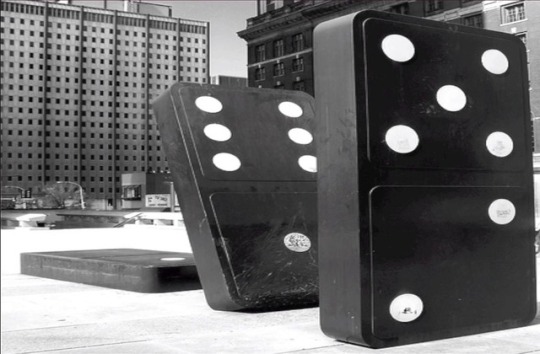
So let's talk a little about Fatalism, a philosophical position that suggests the subservience of all activities and happenings to fate. Fatalism generally refers to any of the following ideas: The view that we are powerless to do anything other than what we actually do. Included in this is that man has no power to influence the future, or indeed, his own actions. An attitude of resignation in the face of some future event or events which are thought to be inevitable. That acceptance is appropriate, rather than resistance against inevitability. So these ideas are closely related to determinism and defeatism, which are mindsets that are associated with pessimism and cynicism, which are indicative of grounded positions rooted in the dark spectrum of ill psychologies.
So, right out the box, we can see why these presuppositions appeal to the average, sardonic man. It relieves him of all responsibility, makes him feel less emasculated by his own disempowered disposition, enables the pathos of his hapless condition, and helps him feel less guilty about his own inaction, apathy and any possible immoral behaviors; assuming that he has a shred of conscience that causes self reflection and recapitulation. It's not safe to assume that. This is a very degenerative state of existence for a human being to resign himself to. It's basically throwing in the towel and giving up. It is often a position that develops as a result of a long journey into the depths of the external, which will always, without exception, conclude with disappointment and failure to assuage the common anxieties that plague the modern man. Indeed, so many of us are like hungry ghosts, wandering around in vain, searching longingly for something to fulfill our desperation... and we can just imagine how the hungry ghost's search will turn out, for there is nothing found externally that will ever bring it lasting peace.
But, in a way, the fatalist is right: with this mindset and attitude, and the refusal to investigate and probe deeper into the introspective source, fate will command your path. For those that are content to hit the cruise control and ride their existential agency out on auto pilot, your course will be ruled by destiny, no question about it. But. for those who have done a little deeper experimentation and investigation into the source of awareness, the only factor that cannot be disputed due to the discernible empirical first hand self evidence of such, these suggestions are utter nonsense, and irresponsible dereliction.
"We are powerless to do anything other than what we actually do."
What is that? Does this actually mean anything, or is this just a hungry ghost moaning about his bleak plight? What else would you hope to do, other then what you can actually do? Maybe you are getting caught up on the inference of the concept of 'actuality', of which, is comparable to defining one's limits and possibilities to a shackle around one's ankle. What is actual is that you are aware of an experience of a reality; beyond that, anything else proposed will either contribute to weighing you down, or will serve to facilitate your freedom from self imposed limitations. It's as simple as that.
So much of how everything is assembled is arranged so to fortify your disempowerment, and at the core of this marginalization is the dictating narrator, the constant chatter of the thinking mind, which reinforces the disempowerment by continually sustaining it through stubborn attachment to dogmatic narrative; external verification substantiated by way of reflective aspects and validation via confirmation bias. All of this gives the impression that the restricting parameters are not the result of self imposed limitations, but are, in fact, the unbendable laws that one has no choice but to abide. And of course, this assumed set up fits well with most people's predilection, so it's a self fulfilling prophecy and a cycle that eventually reinforces itself with little or no provocation. The notion that you are powerless to do anything other then what you can actually do, in itself, is self defeatism, for it helps to revert the awareness into conformity to the idea of powerlessness as the accepted normative condition, while promoting the idea of the severe limitation of the existential agency; casting a cloud of weakness, and hence distrust and disdain, to the very aspect that is most sure, most immediate, and most self evident.
With this as a mindset, which we can liken to a harnessed horse with blinders, what kind of conclusion about reality will be realized that isn't in deference to some sort of external phenomena? This is the conditioning that must be unlearned in order to take responsibility and command of your reality. Things are not as solid, fixed and rigid as we fancy them to be. Anything and everything, in your idea of an outer space contextualization, was originally sourced from a superpositional potentiality. There is no such thing as actual phenomenal content; for, anything manifested, whether it be an object, a force, a law, or a material phenomena, is empty unsubstantial transient and impermanent. Increased lucidity reveals the hidden designs of these projections as sourced from pure potential, which is the foundation of physics and the source of all manifestations. And pure potential doesn't follow any rules; it produces rules. Pure potential isn't bound to anything as limited and contextual as determinism. If determinism does have any role as a factor in a produced reality, then it is only as a supportive role, conditional to, and framed within, a manifestation with borders; of which, is rooted in pure potential, which is limitless, undefinable, immeasurable and ineffable.
We can become powerful when we position ourselves to be unbounded by actuality. This requires meta awareness and detachment from the identification with the persona; which, cannot influence the future or even it's own actions, due to being immersed in disempowerment. Indeed, only those whose mind's are untethered from the rigid confines of the worldly ego can influence the conditions of the present moment; which is all there really is, in truth; the ideas of past and future being only illusory concepts, with no basis in reality, which is the false premise upon which the idea of determinism, is constructed.
And, of course, the untethered awareness can also influence the actions of the persona, which is afforded to those who are not slaves to the impulses, desires, and visceral demands of the physicality. Without this, it's understandable why an ego would resign itself to the idea of an inevitable future, for it is powerless in this state of being, and with this program as it's conditioning, resignation does seem like the appropriate response, because mere thoughts and actions performed by a world based persona are not going to make any difference. Yet, on a sort of side note, if we consider pure potentiality, in a sense, the fundamental essence could be said to be both eternally always so in superposition, yet deterministic, for the oneness of all that is, while non-committed and free of all qualities, is always as such, determinedly so. And the cosmic Maya of time, change, development, condition, and circumstance, while of illusion, are, at the same time, as illusion, equally forever present, never created nor destroyed, perpetually happening instantly and simultaneously.
But this is a bit tangential to the specific matter of a persona in delusion, struggling with paradoxical absurdity. But it does highlight that illusion does have both the qualities of determinism and free will, but much of it will depend on whether the mind is over the matter, or if the matter is above the mind. When the matter is over the mind, the persona will be at the mercy of fate, as it is identifying with illusion instead of knowing itself as the source of awareness; and as such, will be subject to conditions, which are bound to a cause; and causes, under these conditions, are tied up in dependent origination. Brining the mind over matter is to break these rules, much as a hacker can compromise a program, and this leads to the wisdom of knowing that, as lucidity reveals, illusion is a production of the mind, and as such, ironically, there is nothing to change, nothing to command, nothing to gain, and nothing to fix; for what good does it do to tinker with an illusion if one is already awake and aware that it is the source of these illusions, which only beg to be changed, commanded, gained or fixed, when one is in delusion? But, if you are not of the mind to take responsibility for reality, and are resigned to let illusion steer the fate of your ego, then also in this case, there is nothing for you to do about it; and while this buries one deeper in illusion and makes it much harder to self recognize, perhaps it can reveal the flaw in the fatalistic reasoning.
It's called the "Idle argument", which states that if something is fated, then it would be pointless or futile to make any effort to bring it about, so why not just be idle instead? The points of the argument are stated as follows:
If it is fated for you to recover from an illness, then you will recover whether you call a doctor or not. Likewise, if you are fated not to recover, you will not do so whether you call a doctor or not. But either it is fated that you will recover from this illness, or it is fated that you will not recover. Therefore, it is futile to consult a doctor.
Indeed, if you are resigned to fatalism and a deterministic belief system, then really, there is no reason for you to do anything at all, for whatever it is that you do, or don't do, is already determined, and since it's already determined, there isn't a choice to make, a casual action to perform, an effect to influence, nor any conditions to change; unto yourself, others, or to the world. So you might as well stay in bed all day; and don't worry, if you do, it was already determined to be that way by fate. So does this really seem like a sound philosophy? Or just an elaborate device designed as an excuse to not do anything; or if one does something, to not take any responsibility for doing it, or not doing it, as the case may be.
But what about logical fatalism and the argument from bivalence? Well these are very antiquated arguments, and not that difficult to pick apart due to being based on weak limited tools of reasoning. Logic does have it’s application, but it is hardly an all encompassing be all and end all, believe it or not. The key idea of logical fatalism is that there is a body of true propositions (statements) about what is going to happen, and these are true regardless of when they are made.
So, for example, if it is true today that tomorrow there will be a baseball game, then there cannot fail to be a baseball game tomorrow, since otherwise it would not be true today that such a baseball game will take place tomorrow. What if the baseball game gets rained out? Then what? Then what was true today fails to be true tomorrow due to an unforeseen factor. Furthermore, to suppose that there is a body of predetermined true propositions fails, due to indefiniteness and the lack of identification of the agency where these propositions are given context of truth, outside of the subject that is asserting such presuppositions. Through logic, one may assign a truth value to a proposition before something is shown to be true or not, but one cannot assign a definite one. How could that be justified?
I hate to say it, but much of these notions of predetermination, destiny, and absolute truth value, stink of theological concepts. Logical fatalism assumes a perennial set of all propositions, which exist without being proposed by anyone in particular, and for that reason alone, are incompatible with logic. Where are these predetermined definite predictions assembled? Predetermined by what? By whom? Where are they located? When were they made? How were they determined? Why are they predicted as such? If you want to assert the pre-existence of truth in the future then you need some basis to substantiate it, and so, on what are you substantiating it upon? Pre-existence of truth in regards to what? What is it pre-existing exactly? Relative to what? Pre-existing to the subject that makes all this shit up? Yeah, of course. That's always the underlying motive, isn't it? If there really is pre-existing truth out there, independent of the ones who define it, then this begs for explanation. By explaining that it is the objective configuration of a material universe doesn't explain one damn thing, since you cannot substantiate the context and origination of this so called universe. We assume a universe exists because we experience it? Ah well, then it sounds like the only thing you can be really sure of at the very least is that you have an awareness of appearances. Beyond that, you don't really know jack shit. You are just telling stories about appearances, not much different then theology.
So pre-determined truths exist independently of the very thing that provides you with the ability to determine a truth? Fascinating. And I suppose the universe has it's own story independent of the one who is telling the story about it? This universe does seem like a great mythology, but if you wanna push the truth of its independent existence, then authenticate that it's independent please. Oh right, you can't do that. So then this whole idea ceases to be logical determinism because it is depending on fallacious arguments; and what good is logic if it is only a tool of an inconsequential subject that is a byproduct of something that exists independently of it? Doesn't really sound like all that great of a tool at all. I'd prefer a tool that exists independently of me. I think it might be somehow more reliable since it's a tool that's not crafted by my own bias. Sounds handy!
Then there is the so called “principle of bivalence”; the idea that propositions, that it to say, statements of opinion or value judgment, can only either be true or false, absolutely, with no in between; which is a silly proposition in itself.
Here are some statements that can be either true or false:
Pepperoni pizza is the best type of pizza when seasoned with garlic.
Irishmen that own lawnmowers don't drink alcohol.
Dogs with leather collars chase squirrels.
It is not certain whether or not a healthy diet will result in weight loss.
Should I continue? This principle is just another tired presupposition of objectivity and absolutism, which is attempting establish these theories as default axioms. If demonstrating how it's not accurate to say that a proposition can only either be true or false, due to ambiguity, uncertain variables and the indeterminate nature of a future truth, is in discord with classical logic, then logic really is a weak tool with very limited application.
I will further deconstruct logic in the future, but for now, I'll wrap this up by pointing out that so much of the motives behind fatalism, as is also the case with most philosophies, ideologies, theologies and mythologies out there, involve the usual attempt to dismiss the interconnectivity of reality with the mind, and to keep the externalized monkey in the mirror syndrome conditioning intact. It's rarely ever just said outright, for they don't even wanna draw attention to it by even mentioning it, but instead, it is indirectly implied through various elaborate philosophical confections, complex mathematical equations, intriguing scientific postulations, cloak and dagger conspiracy theories and fantastical theological allegorical parables. Yes, there are many different fashions of distractions and diversions, but all of them share in common the aim to misdirect the attention away from itself and to fixate on the perceptibles, all of which serve to reinforce the conditioning of the disempowered mind that is in self imposed submission to matter. Will you take the necessary steps to examine this condition, discover it's secrets and free yourself? Or will you simply become a modern day fatalist, resigned to a destiny that is out of your hands, living a life of a hungry ghost, stuck in a medium of predetermined stifled helpless desperation?
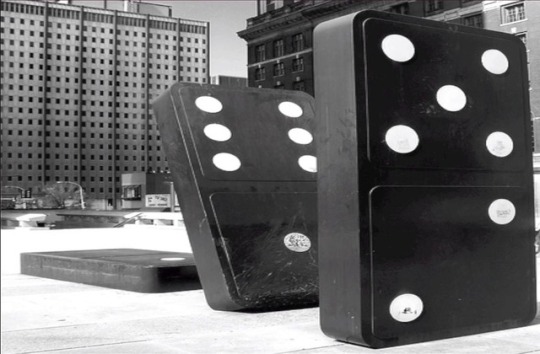
2 notes
·
View notes
Quote
“once you recognize that there is something else operating that is beyond your ordinary sight, don’t bother with the content. watch the pattern. the content is a distraction from you being able to see the vastness of the construct because if you could see it, it would begin to fail. PAY ATTENTION. this isn’t about ONE INCIDENT. #BlackLivesMatter “
-written as a comment in response to a white Buddhist practitioner’s inquiry about knowing when racism is present –aKw
as a Buddhist, you may get this: just as the ego-mind is a construct that constantly reinforces itself, building structures & systems of control and develops attitudes & views that maintain it’s primacy and sense of solidity so that it can substantiate its validity, so, too, does the construct of whiteness. one could think of it as the Mind of Whiteness. you live inside that Mind, such that you cannot see—yet—outside of the reinforcing perspectives that affirm and perpetuate the White Superiority Complex. that complex would disintegrate if it could view the vastness of the presence of racial bias. so you and the vast majority of progressive whites, and i daresay especially buddhists, remain blind and thus ask questions that are very much a part of the need to escape the sheer anguish of how pervasive it is, how you participate and how seemingly inescapable it is. but just as the ego-mind cannot be used to work it’s way out of it’s own construct, so too can the Mind of Whiteness not be used to see through the veil of its own construct. so we sit. and we feel. and we let what arises do so until the resistance is worn down, or moved through or even overwhelms us. on the other side, we see a glimmer of something that we couldn’t get a handle on for our desperate need to avoid it. we see Truth. and when we catch a hold of it, we see the patterns of our participation in not-Truth emerge. but with a steady mind and true heart, what is apparent to others begins to reveal itself and emerge from behind the fog of our Ego-Mind of Whiteness (that btw, plagues non-whites just as much in different, but debilitating ways). i tell my students: once you recognize that there is something else operating that is beyond your ordinary sight, don’t bother with the content. watch the pattern. the content is a distraction from you being able to see the vastness of the construct because if you could see it, it would begin to fail. PAY ATTENTION. this isn’t about ONE INCIDENT. it is about the overwhelming pattern that forms the fabric of our lives here in America and cloaks our individual and collective humanity. we have failed ourselves. don’t get caught in the trap of the sifting through the fascinating sparkly details when the whole thing is a failure. divest your interest in this failure so that you can begin to develop Right View so you can even begin to see the forest rather than holding on for dear life to a tree. the simple answer: race is rarely all of the story and ALWAYS some of the story in America. period. he should have been indicted because he killed an unarmed person. of any color. but because of the PATTERN, i woke up from the slumber of believing i might finally be safe. i am not safe. my brother is not safe. my father is not safe. because we are wearing this color of skin. if we do not simply submit, we may be killed and not even a jury of so-called peers will have to wonder. having to simply submit, though, means we are not safe. we live in a constant state of low/med/hi-level fear as a people and it is validated on a daily basis. here is the impact of the pervasiveness of the Mind of Whiteness as it is expressed from bodies white, black, brown and yellow and red: because of what i have been taught, shown, experienced on a daily basis in my own fairly privileged life, i don’t assume all cops are racist…i assume all white people are.
and in case it’s not abundantly clear, i know plenty of other colored folks are racist, too. we are ALL working the pain, suffering and misery that the inhumanity of this system of oppression has cast upon us. i also know that as the dominate group that benefits from the perpetuation of said system, it is good, well-meaning white folks’ complicity that keeps in place.
Waking Up From the Mind of Whiteness - angel Kyodo williams | Teacher
9 notes
·
View notes
Text
The American Character of Truly Like Lightning by David Duchovny
Spoilers for Entire Book
I am in deep contemplation of the deeply meditative fourth novel by David Duchovny.
This is a timely book which manages to define and explore the conflict of the American Character during a time where the dualism of the character is set, again, to tear the country apart. This blog attempts to place the themes of the novel within the framework of the American character.
On one hand, the American character was formed in our pioneering days by the concept of American exceptionalism, the belief that we should build the city on the Hill and that the expansion West was our manifest destiny. Deeply ingrained within our country’s populace is that belief in individualism, that sense of adventure, that ability to do and to conquer, to create cities and communities out of wilderness. Those traits are often noble. Yet they assume that the destiny of the people who were already on the land was ours to control. They assumed unlimited land resources and that the land itself was made to conquer; a dynamic which sets us up for the climate crisis of today. The Hollywood portrayal of our Western expansion showed the cowboy and outlaw as the heroes and fueled the myths that individuals settled the West by doing what it took as opposed to pioneering communities struggling together for survival. There is so much good and bad in this period of our history and the common traits developed as part of how we think about what it means to be an American. We sometimes choose the mythology over the history. In Truly Like Lightning Bronson Powers represents the bold, strong adventuring American spirit, moving away from the city to live life on his terms. He has his faith, a hard land to live off of, his large family. He doesn’t pay taxes or raise his children by regulations or government rules. His family survives or dies by their own set of rules and with little outside human interaction. He is as strong mythological character seen from afar as Paul Bunyan. Of course, up close, as we see him clearer. We see some aspects of him and life we might not like. Because he is a human and not a myth.
On the other hand, the Founding Fathers of the United States represented the thirteen colonies who were breaking away from the English tyranny. They were not the pioneers of the Western expansion. There was a deeply intellectual component among these men who founded the great American experiment in Democracy. As imperfect as these mostly slave owning men were, they wrote documents that united all of us as one. It is We the People not We the individuals. They set up a system of governing documents that said all men (albeit all white men) were equal. This intellectual bias towards community and union was reinforce in our American culture by the Immigration of the 19th and early 20th century. We are the great diverse culture, melting pot or distinctive stew of choice. There are the Native Americans and the descendants of slaves who are part of We the People today, but, also the descendants of those who fled famine and persecutions and wanted a better life. The West was “conquered” as much by those immigrants as the descendants of the first puritans or pilgrims. The Spanish were already in the West. Asian and Irish Americans largely built the railroads. We are all here to share in some way the American Dream; even those victimized by it. We are the United and not individual states of America. In Truly Like Lightning we see how messy this interaction of people and cultures can become. We see bureaucracy at its worse. We see people disenfranchised. Yet we see Deuce Powers fighting for the common good. Duchovny doesn’t make this element of our character seem as glamorous, does he? Its a hard life to live in Rancho Cucamonga but individual talents shine through. Pearl has the ‘It”. Deuce can achieve the American dream of an Ivy League education. Yet the unity of We the People has given way to the sixties anthem of Power to the People which rings hollow, I guess, in 21st America but at least the struggles seem real. Most of us can relate.
It is the warring conflict in the American character which makes the population specifically vulnerable to the unique American invention, the conman. Be it Joseph Smith or P.T.Barnum or Malouf or Trump. The American con artist will go for the Big Lie every time. He will play on your emotions about American exceptionalism and what you deserve to become rich and fat off of you. There is nothing the con will stop at because there is never enough to satisfy. This works best when we are lost in the parts of the American identity where the conflicts lie.
Maya is the embodiment of the U.S right now. She is the white girl who is a little ethnic. She wants to protect the environment after she gets what’s hers out of it. She is trying to make it in a difficult world and so it’s ok to play by the rules of the game, even if you disagree with the game, because as a single sort of ethnic female she is the underdog. She is drawn to Malouf, the con, but is equally drawn to that other myth of a man, Bronson. She doesn’t want to be one of the nameless people who are part of the middle class. She wants the big win. It’s the American way, but...part of it doesn’t feel right. She will write a check to Janet in atonement. She is playing with children’s actual lives for a buck. Yet we like her, in a way, don’t we?
In the end, after nine men are dead and she is fired, she heads into the fire. She will fight for what’s right. She will give of herself to the greater “good.” Isn’t that too the American way? Isn’t fighting for the nobler cause part of our heritage as well. Where are our gentler angels today?
The novel of meditation leaves you thinking. The author couldn’t have known about the January 6th insurrection, but I can see that as a “fire” in the desert. I feel like the two sides of the American character are looking at one another. I don’t think our conflict is over. This novel doesn’t give you answers. No more than Bronson standing in the desert looking at the sky gets an answer from his God. The novel does ask the right questions framed in a compelling tale.
*Pamela Stafford has a Master’s degree in American Studies.
0 notes